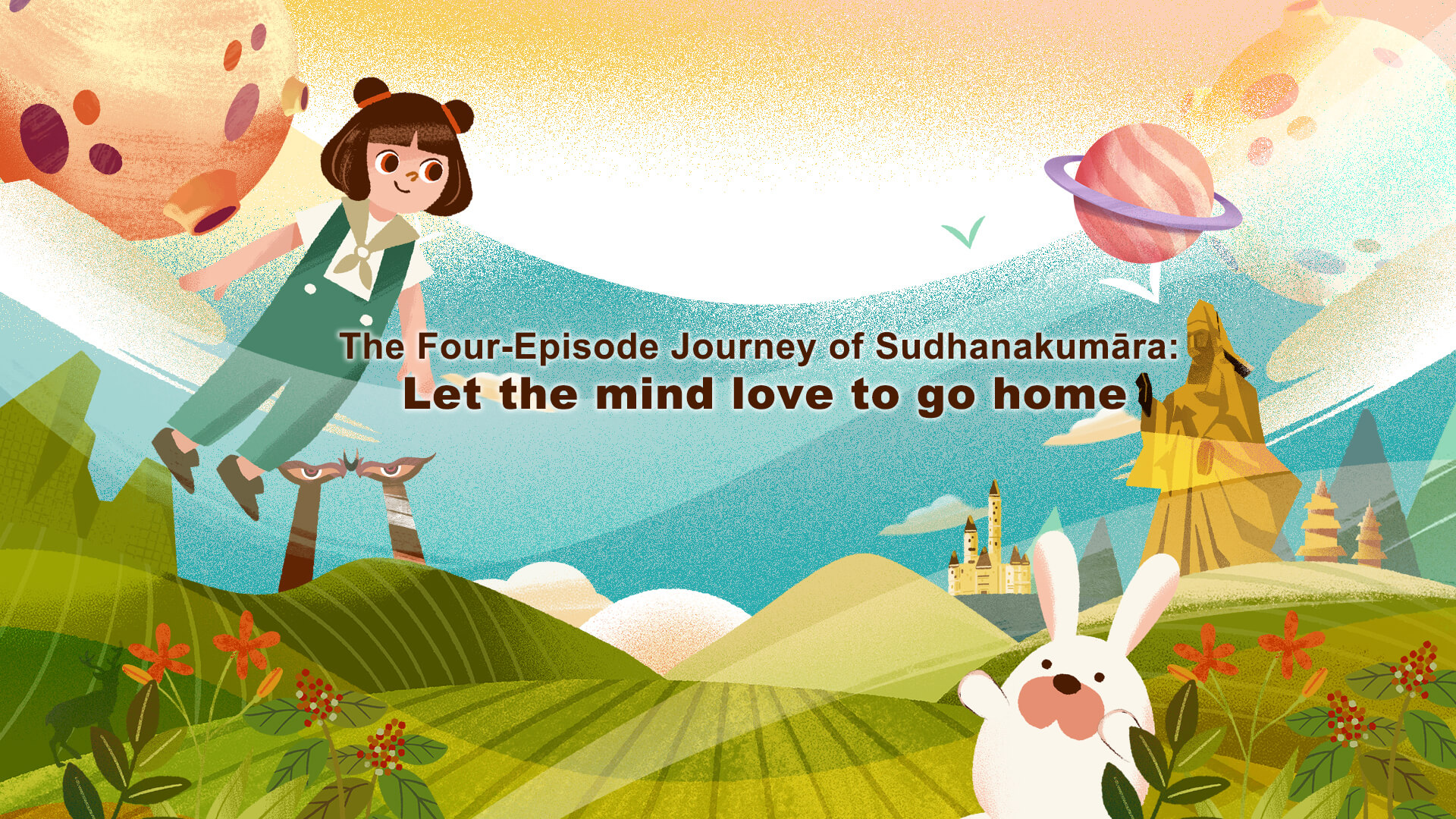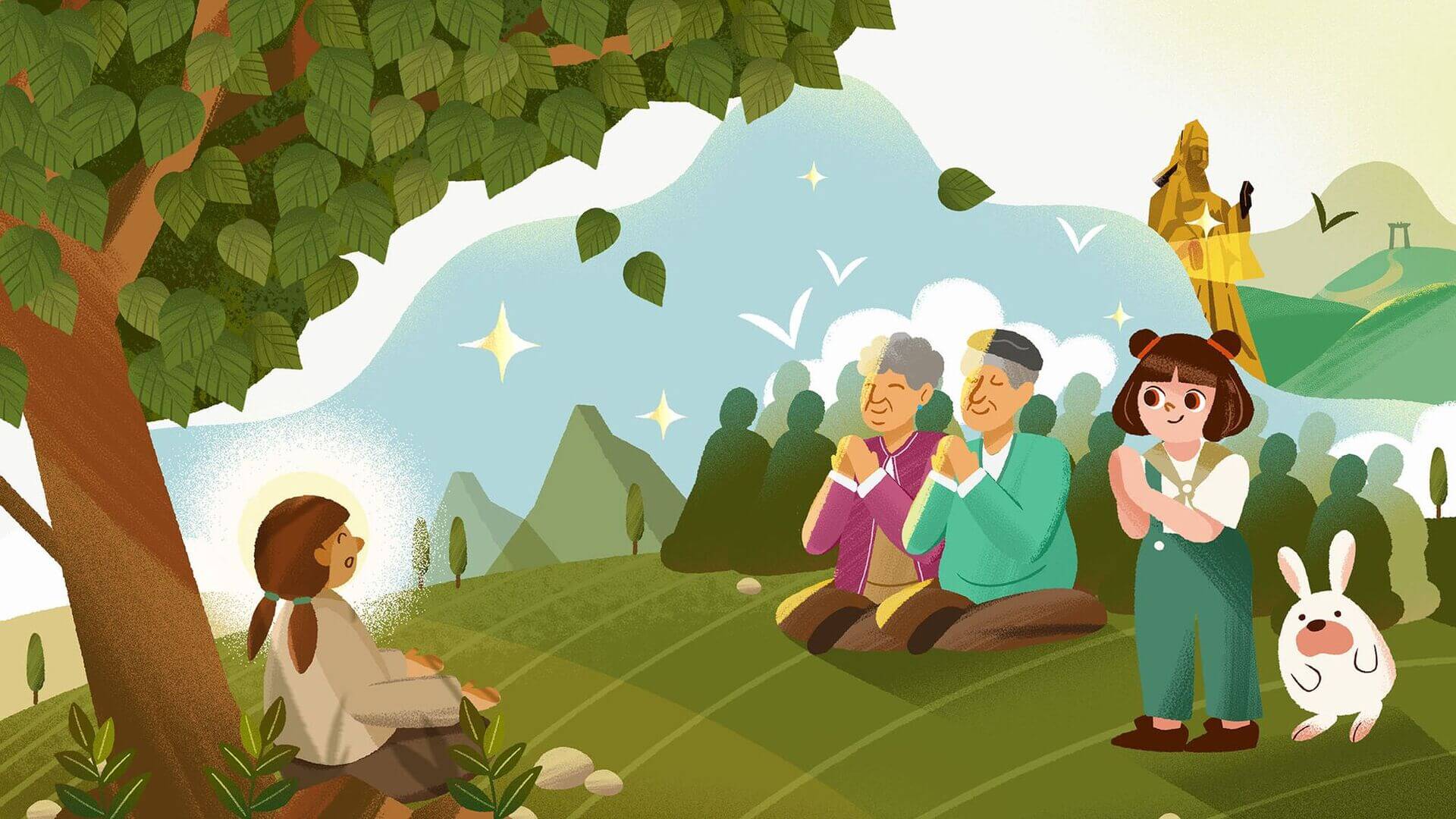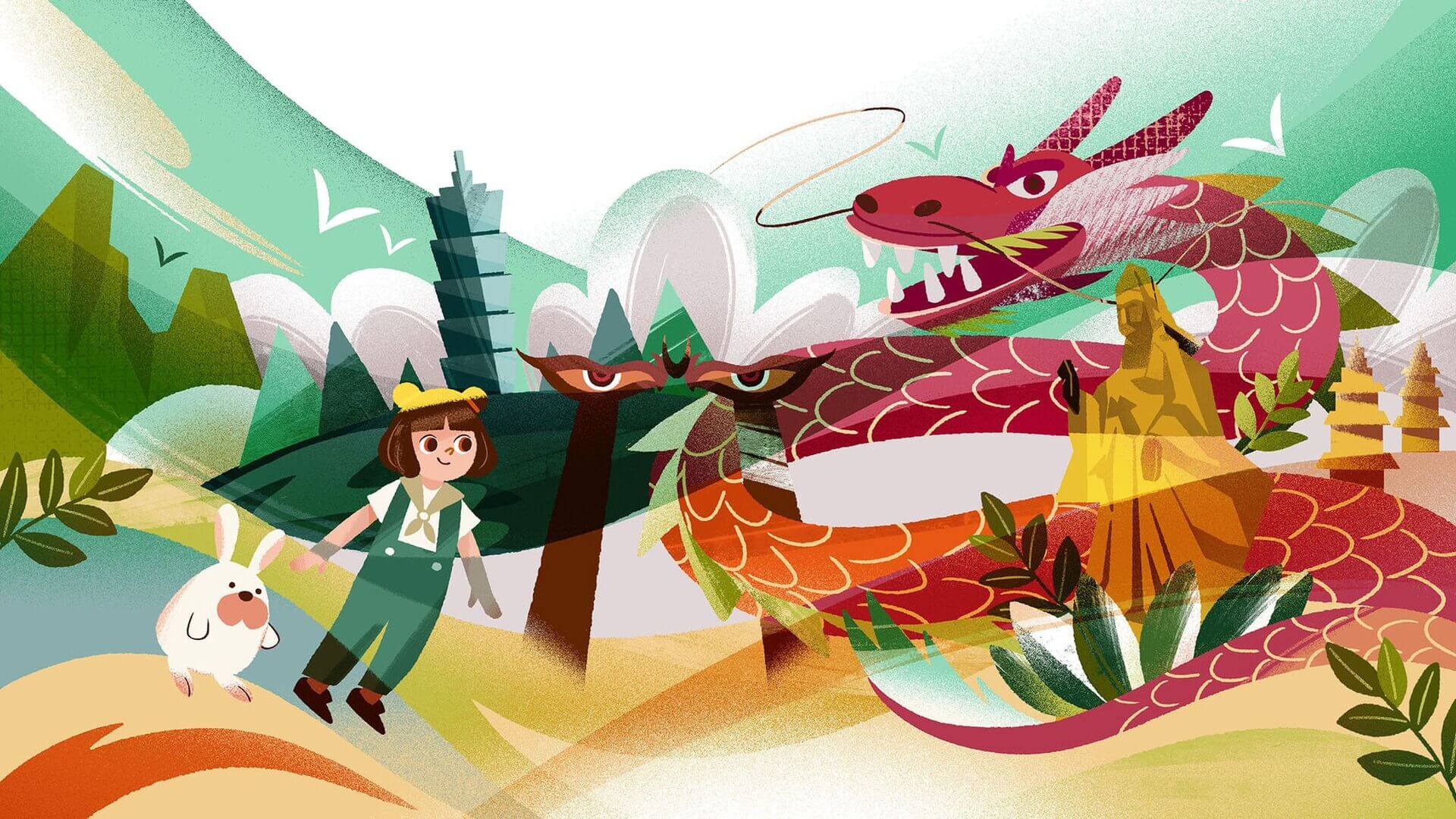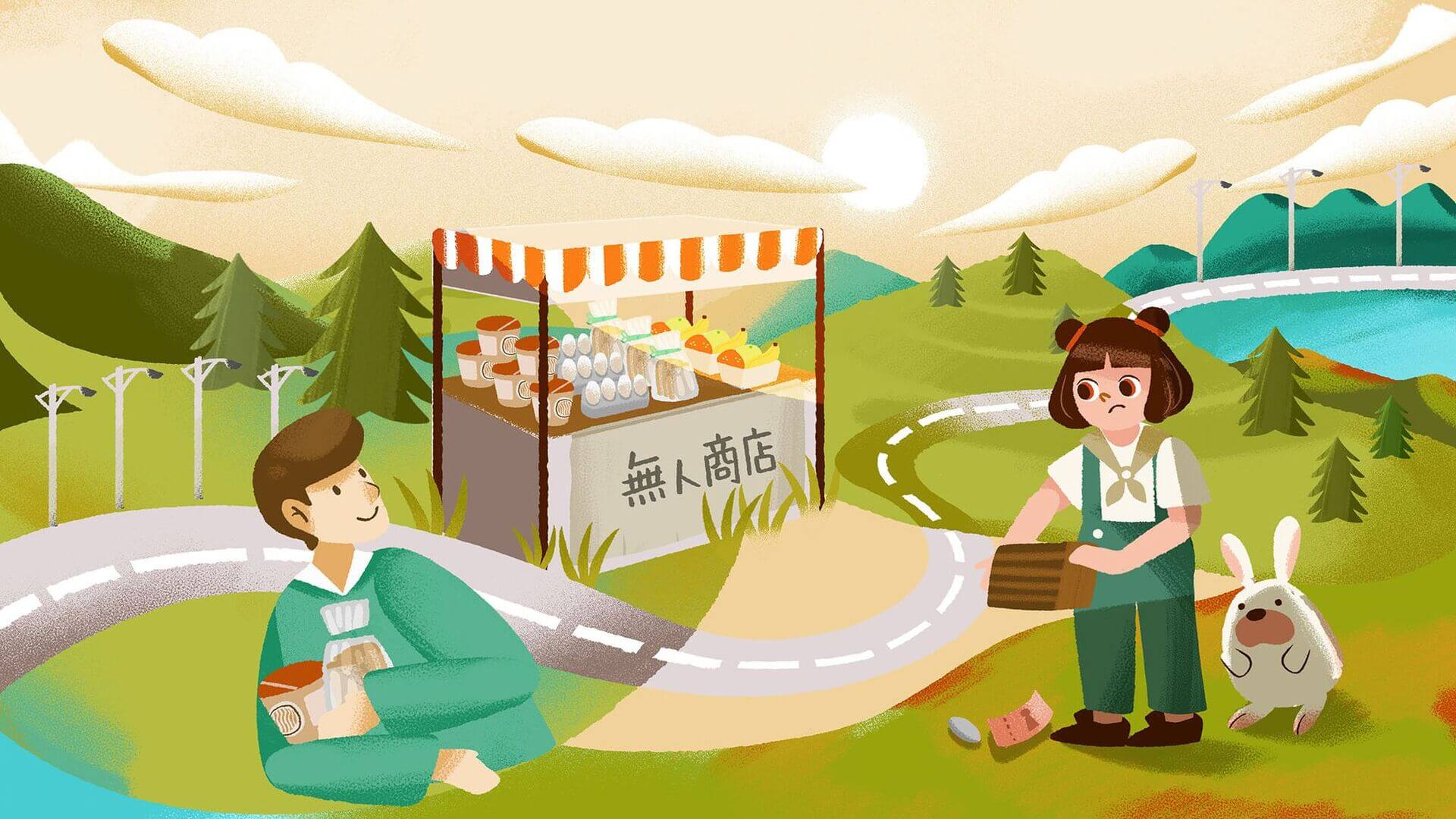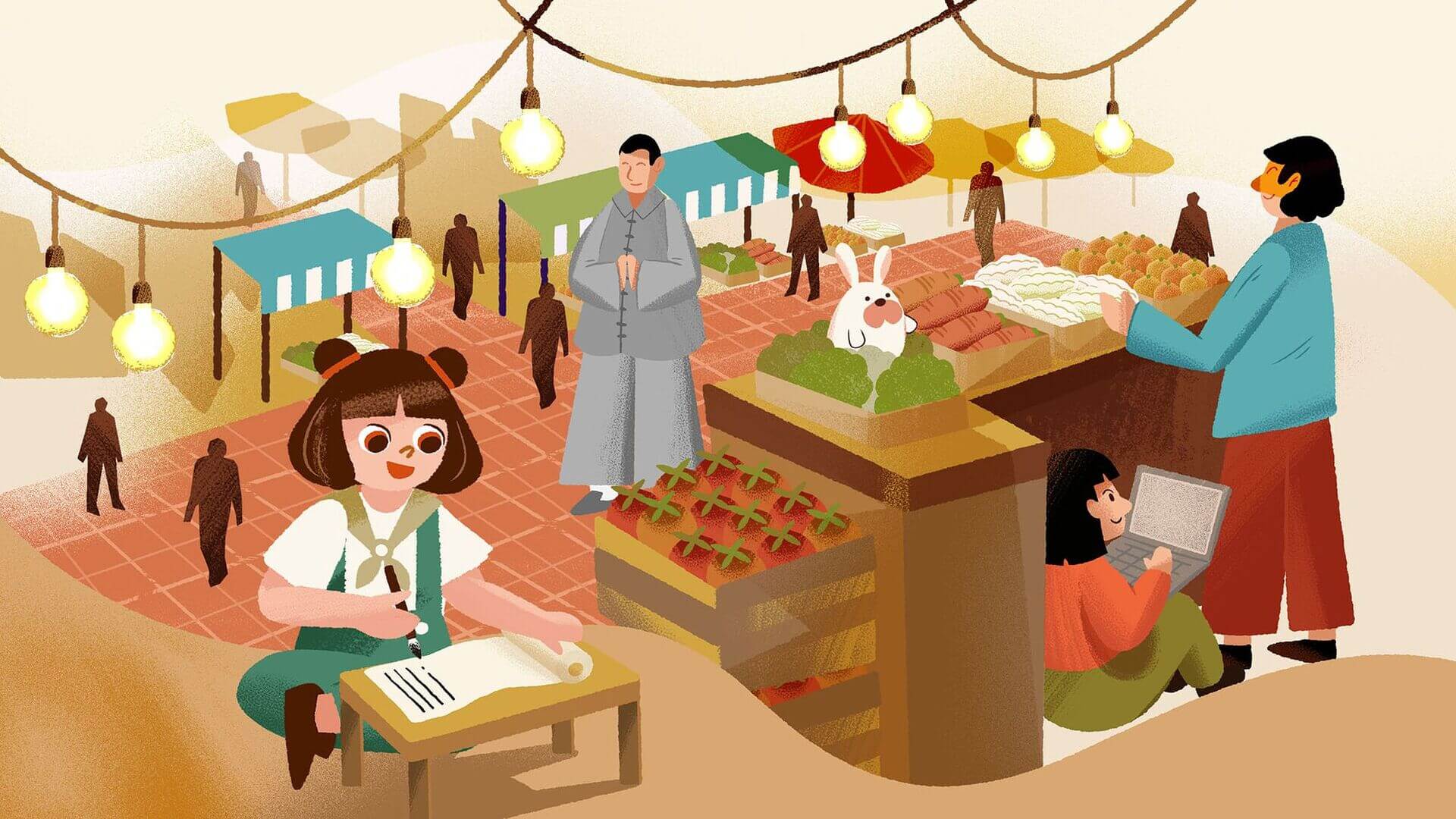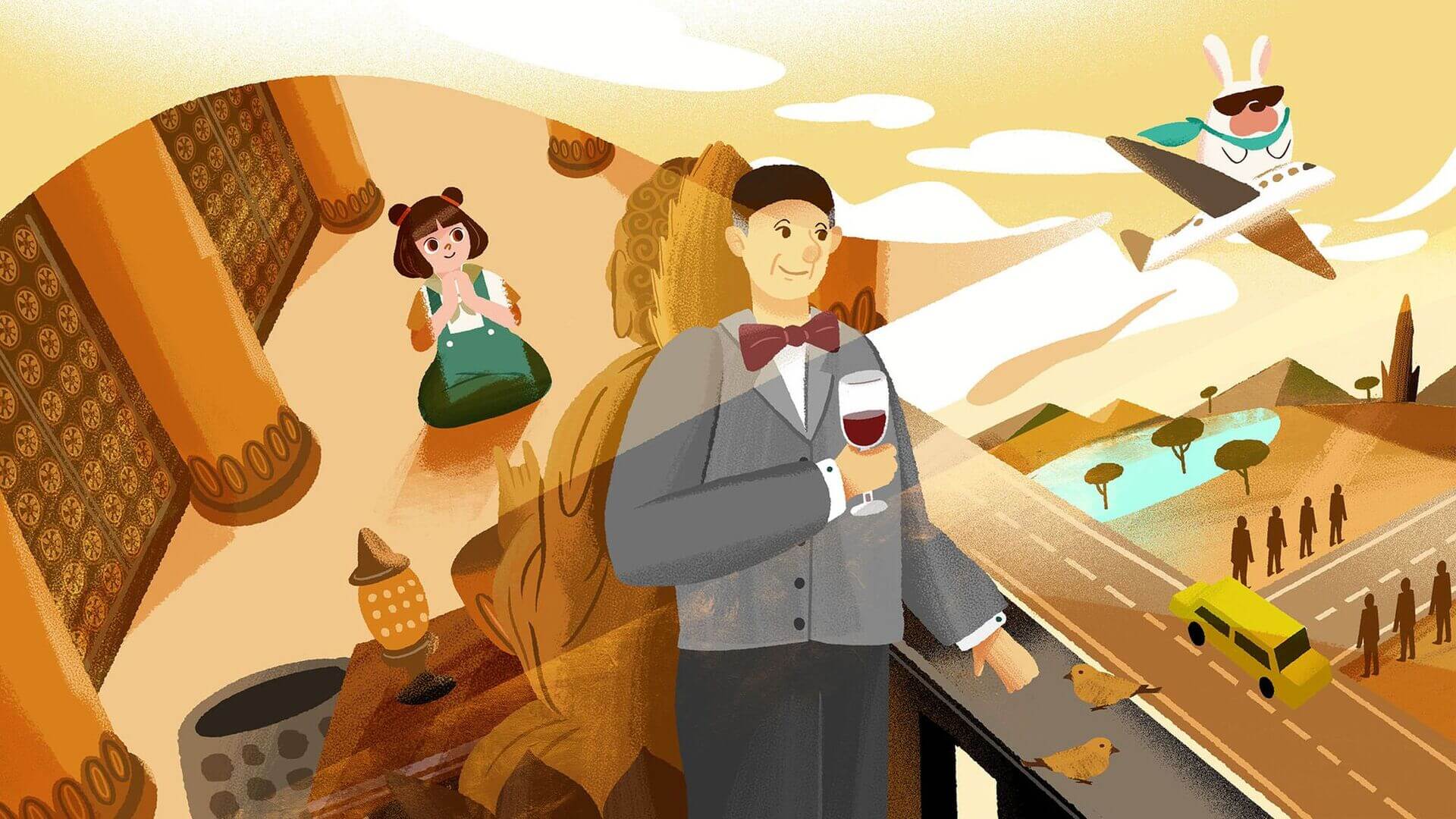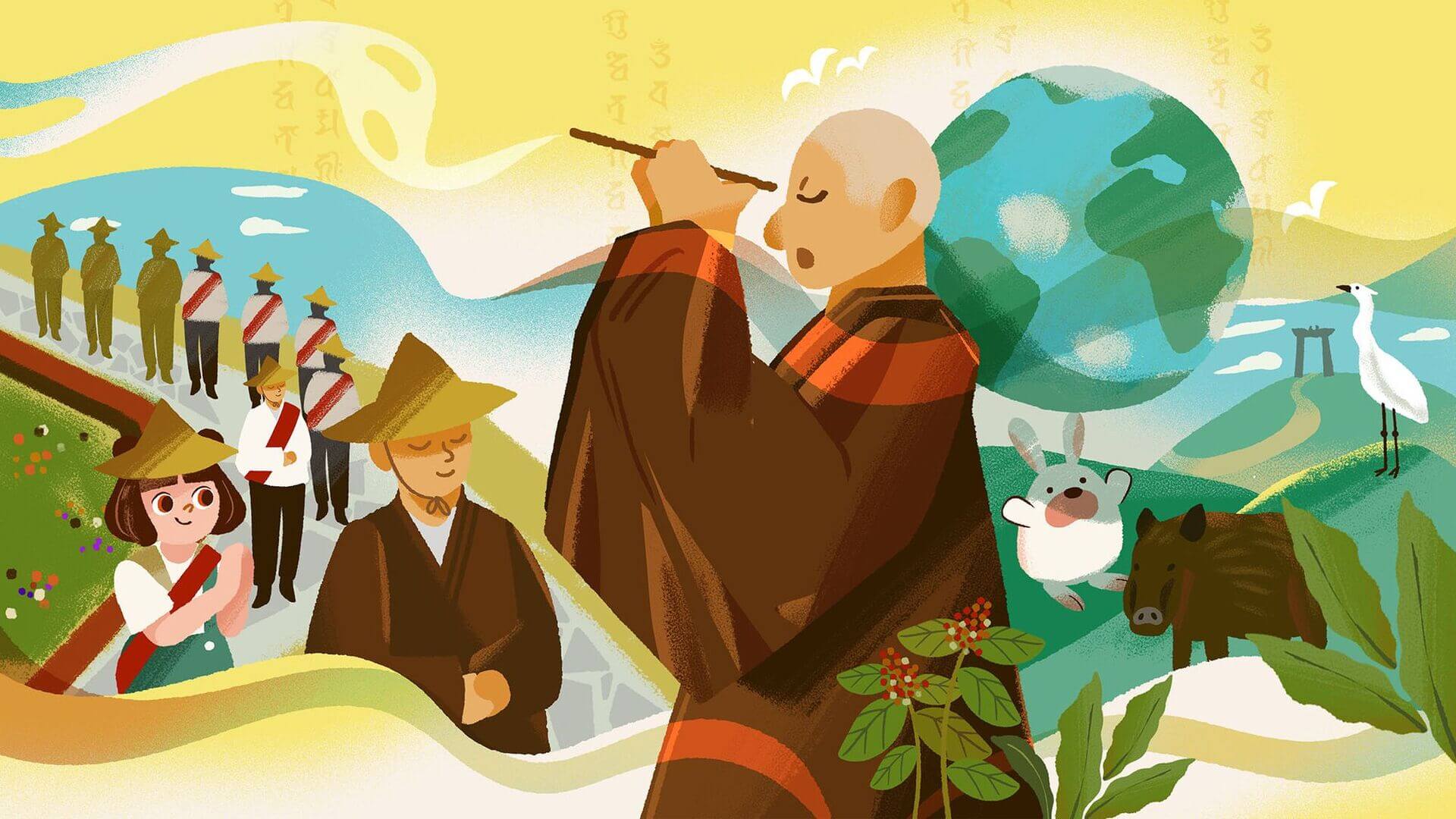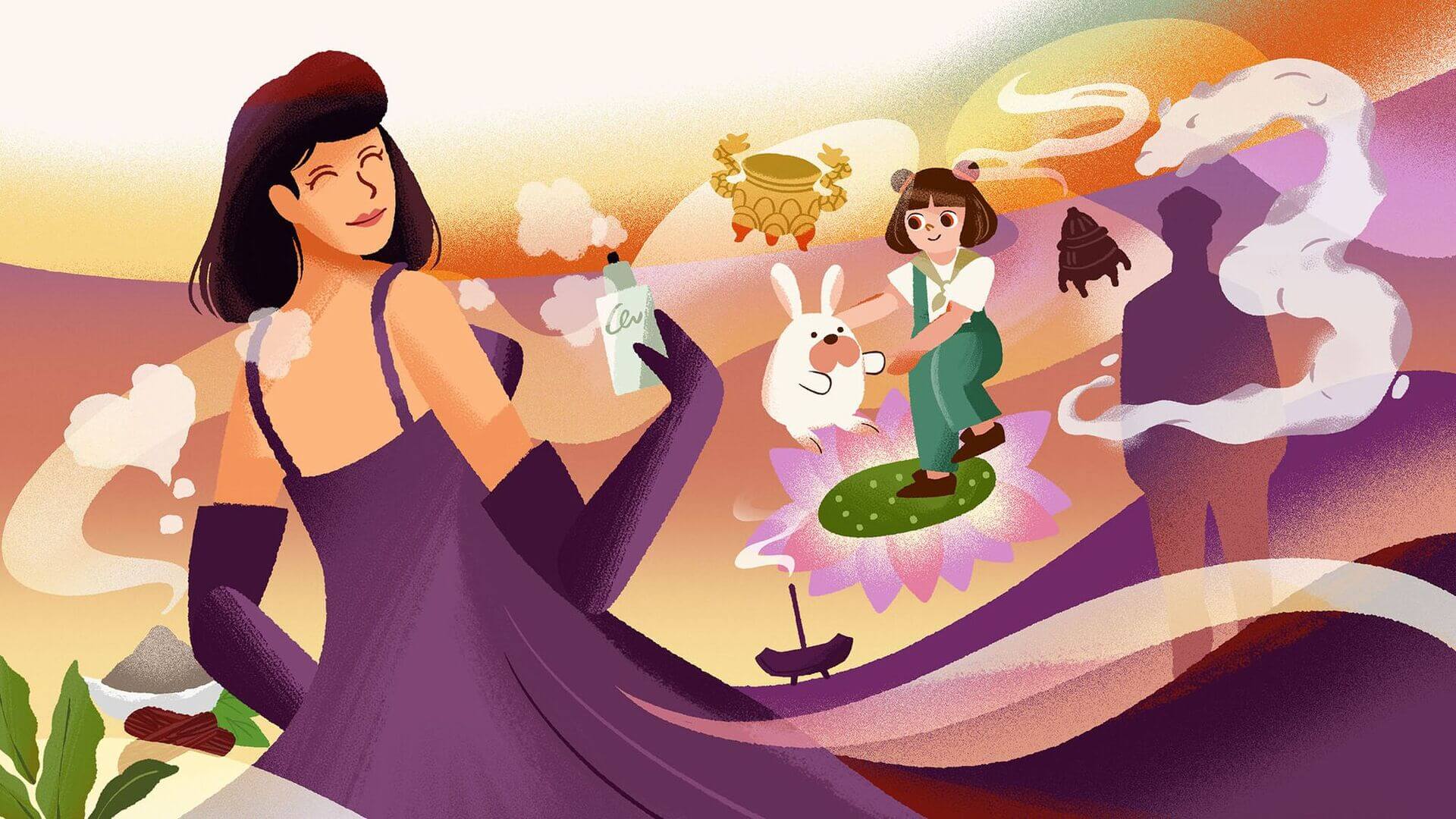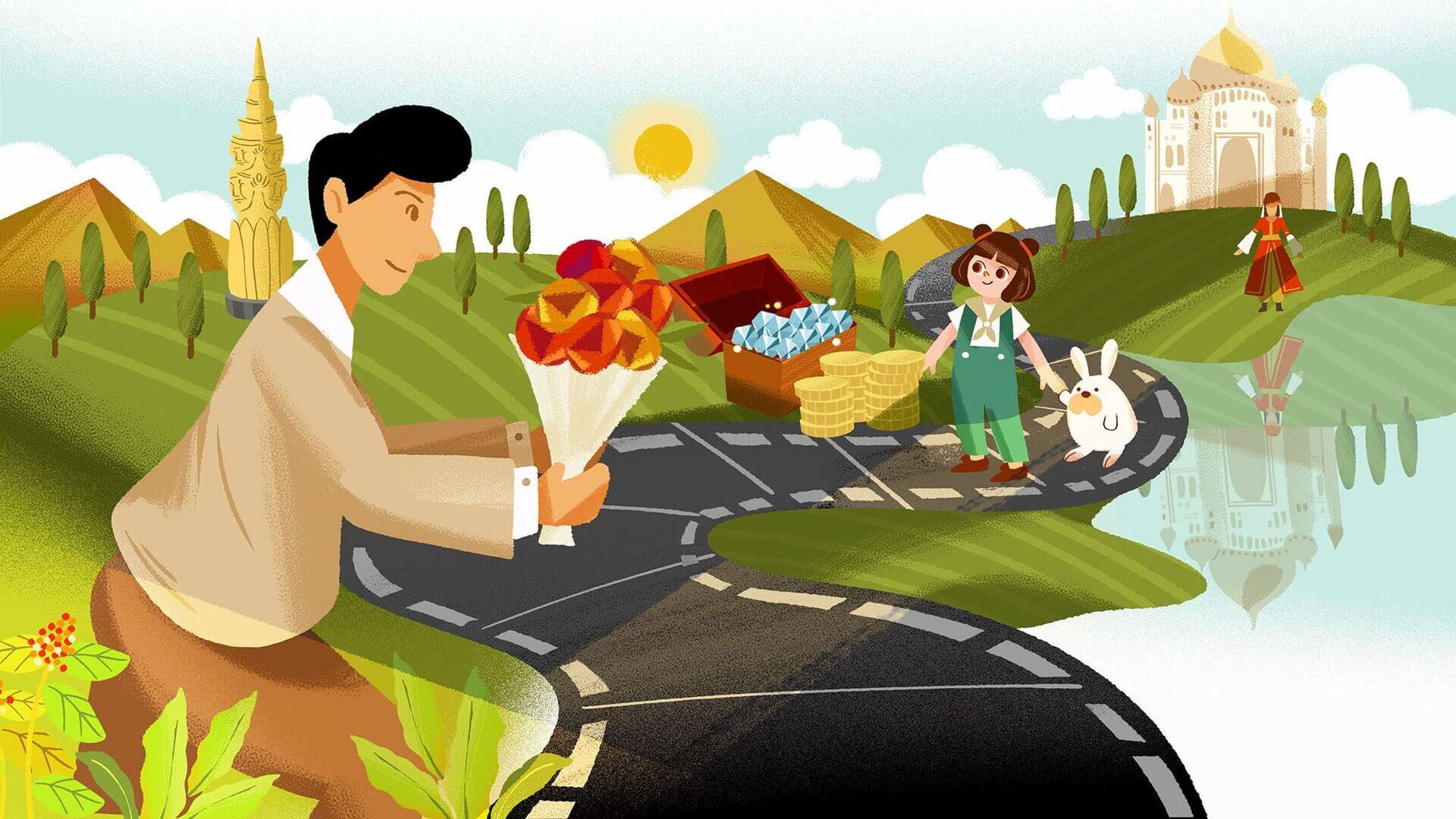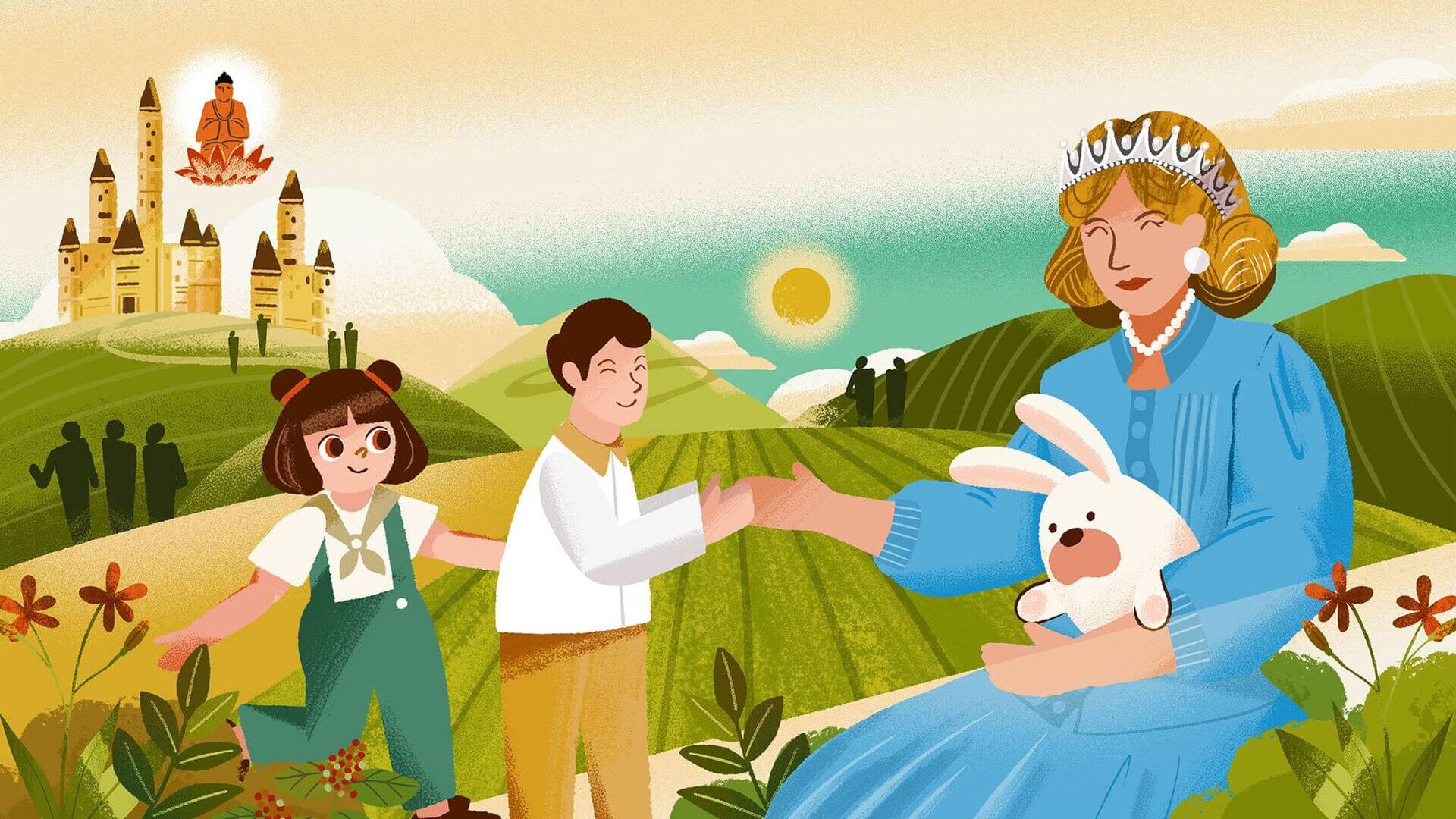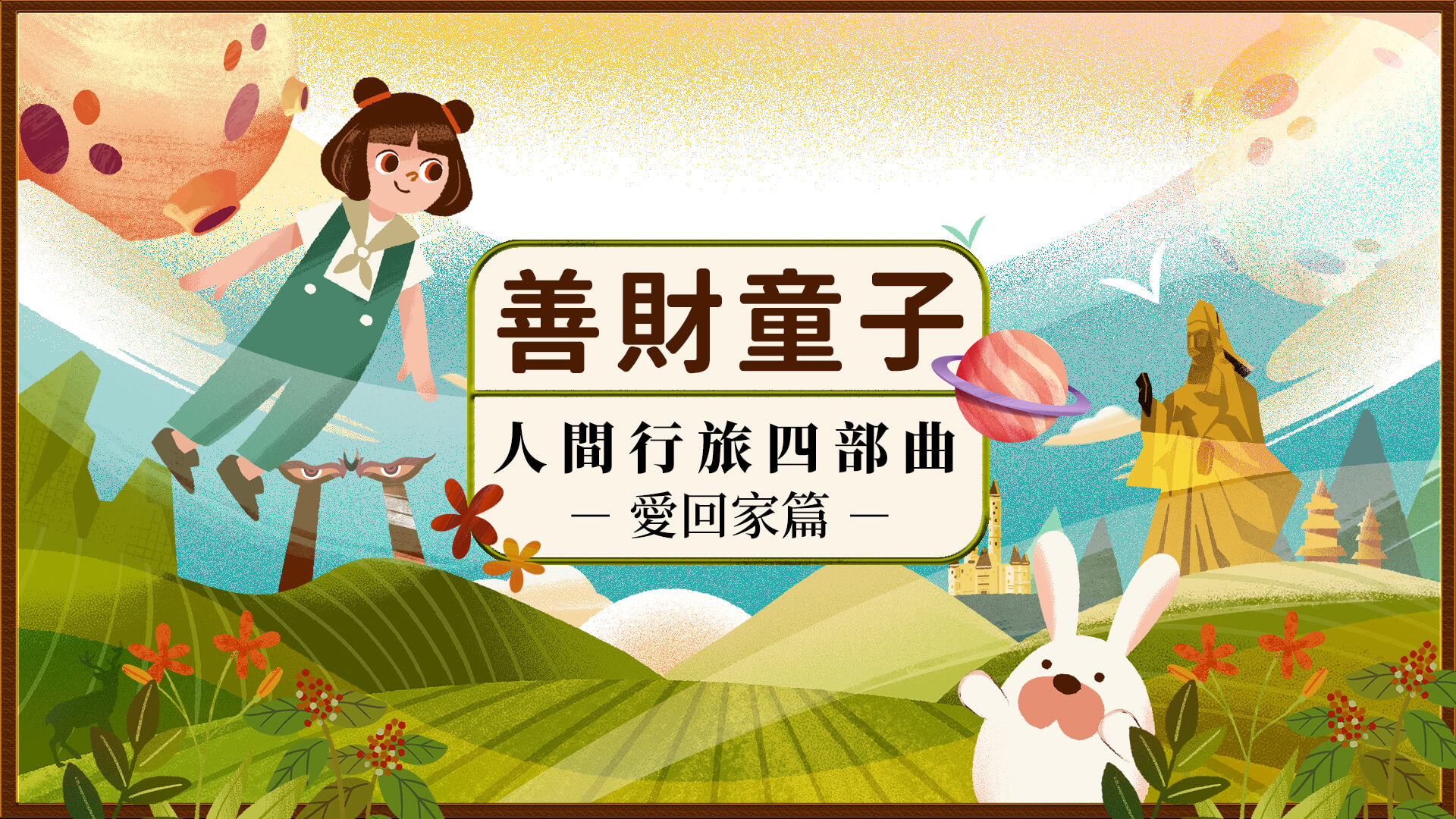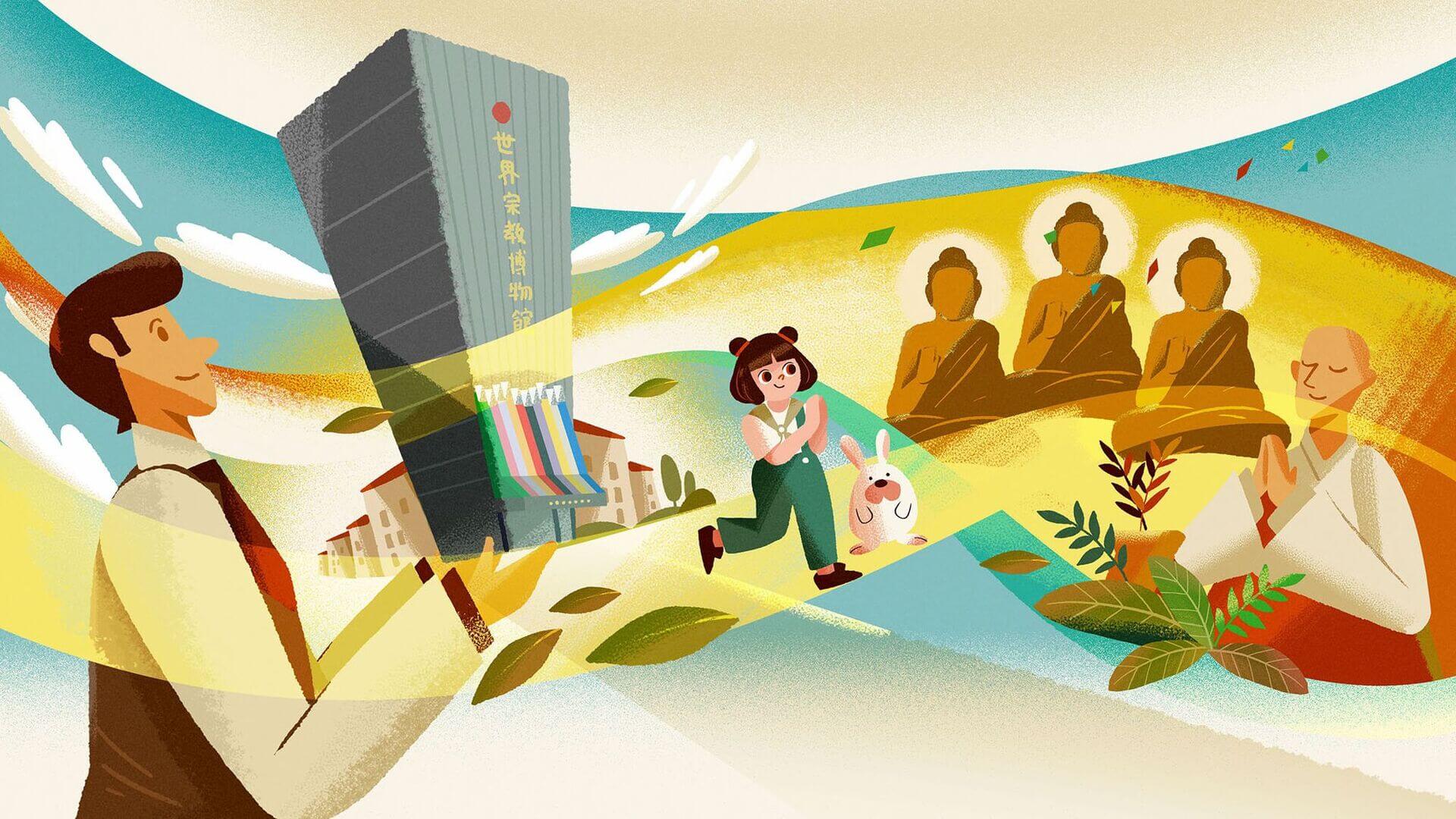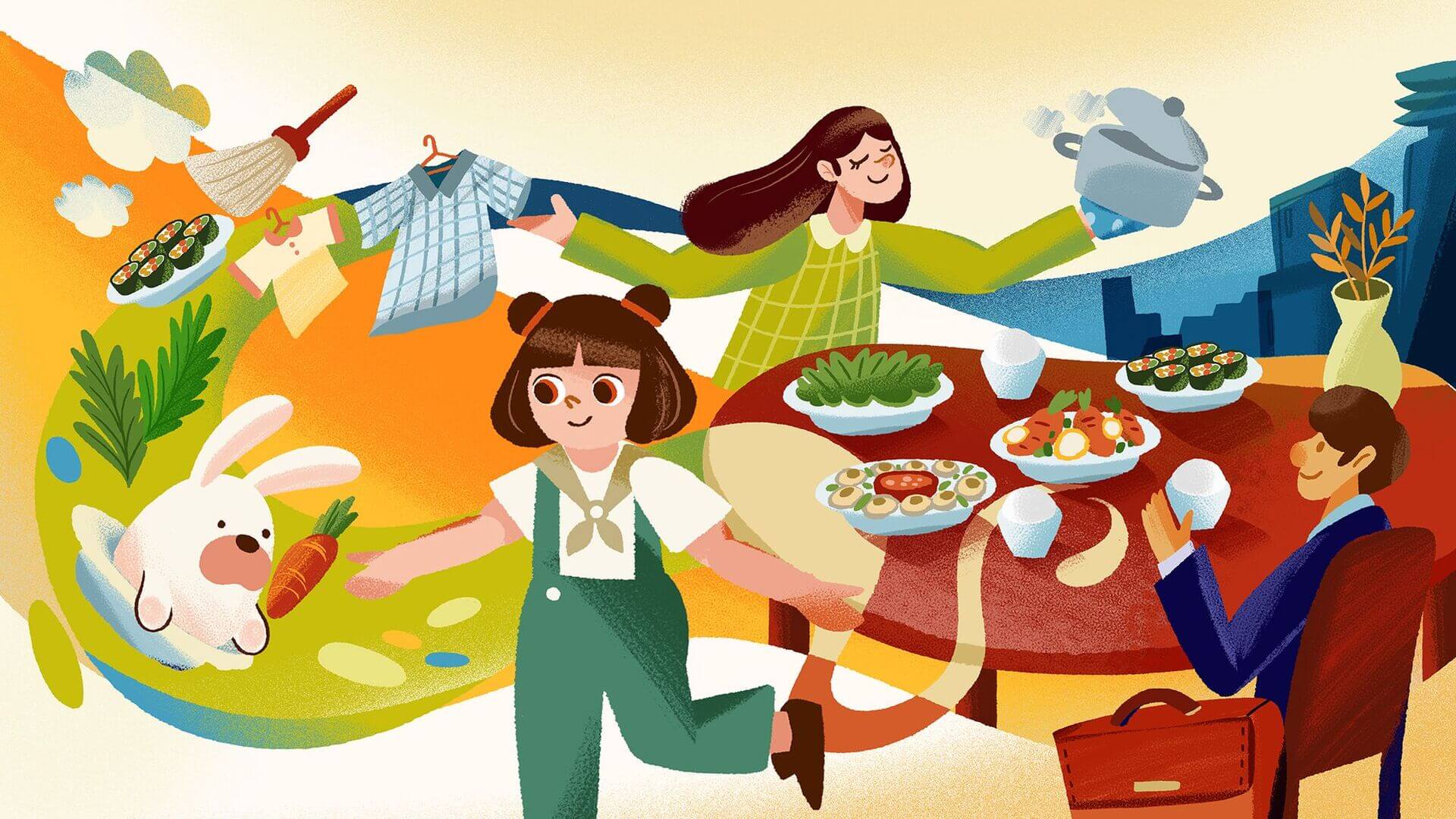Year 2023 sees the 40th anniversary of the Ling Jiou Mountain Buddhist Society (LJM). As Confucius said in the Analects that one should have no more perplexities at age 40, the LJM believe that we are now possessed of sufficient capability to spread Buddha dharma. The “Four-Episode Journey of Sudhanakumāra '' is, therefore, presented as a gift of the LJM to the world. Inspired by the Chapter on Entering the Dharma Realm of the Avatamsaka Sutra, the gift features the adventure of Sudhanakumāra who visited 53 masters seeking for ultimate wisdom. The highlight of the Avatamsaka view is literally spiritual ecology. When the inborn spirituality prevails in every part of our life, it is the time that we attain Dharma-kāya, or the Dharma body. The spiritual ecology can be likened to be part of our body, which deserves our attention and care for remedying illness and problems.
The gift will be presented from 2023 to 2026, divided into four stages that connect the 53 journeys of Sudhanakumāra to represent the progress of Dharma practice. The four stages start with “Living a Mundane Life '' in which one experiences family life before entering into the world of Dharma practice. Attaining the realization to recognize the essence of truth, delusion, emptiness, as well as the issue of “I” is the goal for the next stage “Being Free in the Dream”, while regaining the inherent awareness to comprehend the truth of oneness between humans and everything on earth would prioritize the third stage themed “To the End of the World”. The ultimate mission for the last stage “The Rare Full Moon '' features personal practice of the six living principles instructed by Master Hsin Tao, Founding Abbot of the LJM. Practitioners should maintain their wondrous mind of nirvana, trying their best to realize the nature of life and develop positive ties with the universe.
Master Hsin Tao said, “All the happenings in the world are never independent cases. They are interconnections of lives, and they will lead to integration of all lives. I become part of your life, and so do you.” The world of the Dharma realm manifests co-existing multiplicities which are dependent in terms of rising. We are individual manifestations of the Avatamsaka World. The inherent spirituality is the DNA for the creation of all things in the universe. We are partners, not competitors or exploiters. The world we live in should be a world of sharing. The“Four-Episode Journey of Sudhanakumāra'' centers on the ideas of spirituality and ecology promoted by Master Hsin Tao, exploring the truth of subjects ranging from our mind to the self-other relationship, and the coexisting multiplicity of all things in the universe. The final aim is to retrieve the inward spirituality, to know about how to collaborate with others in the universe for attaining a lasting prosperity and sustainability. The 53 journeys are stories which showcase the ways that we may integrate Buddha dharma into everyday life.The wisdom revealed may lead us to awakening, perfecting the Dharma wisdom to live a Dharma life.
Let’s transform our mind to be the blessed city of the Avatamsaka World, making ourself the modern version of Sudhanakumāra. The people we encounter in the everyday life will be our teachers to help us practice the inherent spiritual awareness, and the every experience on the Bodhissatava path provides us a chance to accumulate our merits for reaching the ultimate destination. Let’s become partners of the journey on the path toward enlightenment, enjoying a wonderful life of Dharma life.
【 The Four-Episode Journey of Sudhanakumāra】
►The Four-Episode Journey of Sudhanakumāra: Let the mind love to go home
►The 2023 Digital Calender
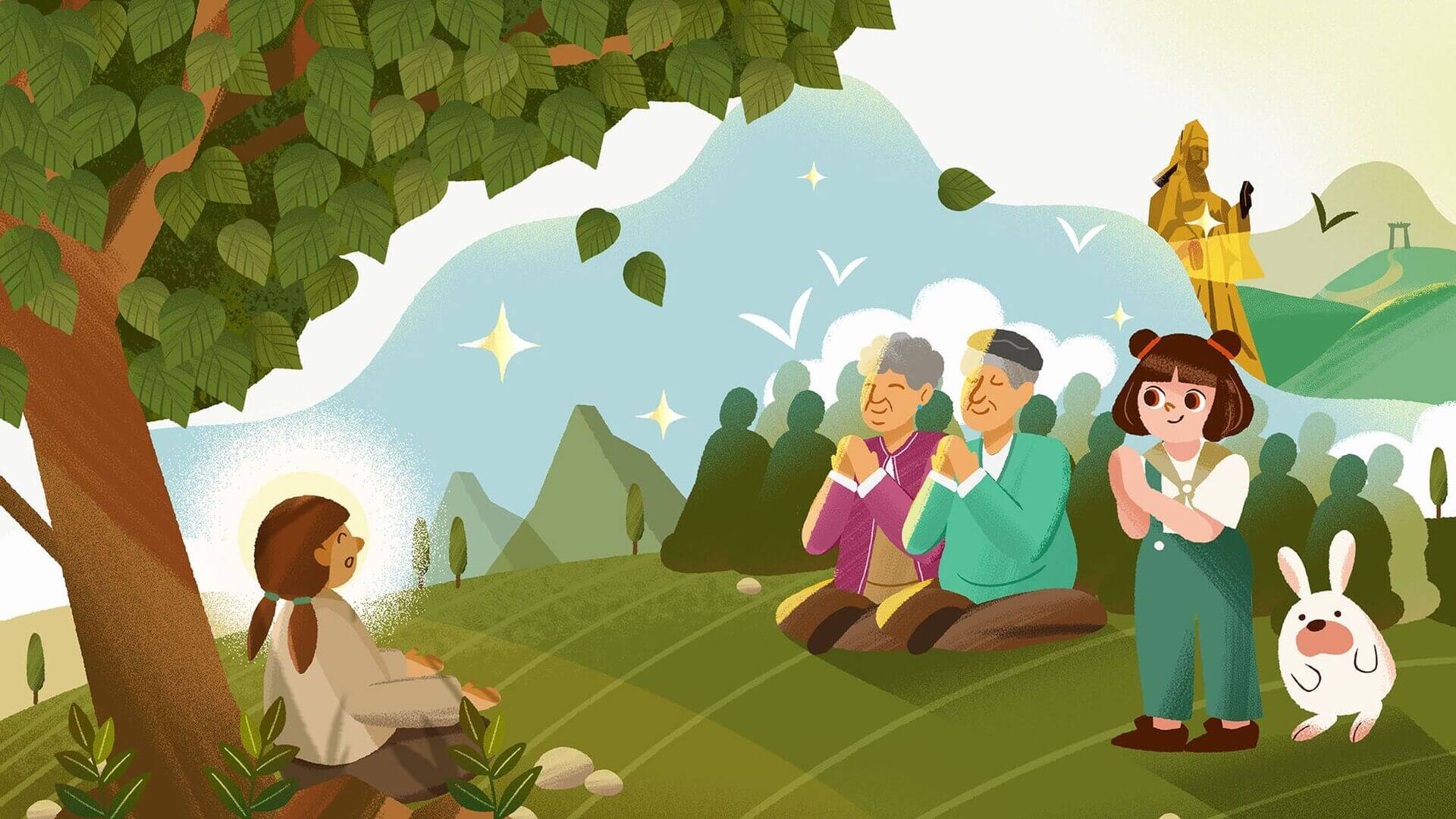
My lovely family
Upasika Acala | The Entry into the Dharma Realm Chapter of the Avatamsaka Sutra
Upasika Acala exemplifies a seasoned practitioner deeply immersed in the teachings of Buddha Dharma. Her profound commitment is manifest in her numerous returns to worldly life, where she gracefully assumes the role of a beloved daughter within her family. This unwavering dedication is complemented by a remarkable set of qualities that distinguish her as a paragon of thoughtfulness, a compassionate and attentive listener, and a beacon of kindness to all who cross her path. Her noble quest to guide her family along the sacred journey of Dharma has propelled her to embrace and master a diverse array of profound teachings and practices. With an unparalleled spirit of generosity, Upasika Acala not only internalizes the profound wisdom of Buddha but also graciously shares it with her family members. Furthermore, she extends this precious knowledge beyond her immediate circle, empowering others to craft more meaningful and harmonious lives. In embodying the principles of Buddha Dharma, Upasika Acala not only reflects a personal commitment but also radiates a transformative influence, creating a ripple effect that enriches the lives of those fortunate enough to be touched by her wisdom and compassion.
Upasika Acala held her parents in the highest esteem, acknowledging them as living embodiments of wisdom and compassion, akin to "Living Buddhas." Her profound understanding of the cyclic nature of existence, where all sentient beings have, at some point in samsara, been our parents, fueled her unwavering kindness and respect for all beings, treating them as if they were her own parents. Cognizant that introducing others to the Dharma was the most profound expression of love and gratitude she could offer, Upasika Acala dedicated herself to guiding them along the sacred path. She tirelessly worked to bridge the gap between her loved ones and the Dharma, skillfully transforming any lingering attachments or animosities within her family into positive connections. In doing so, she not only cultivated a harmonious familial environment but also nurtured her kin into becoming her fellow Dharma companions.
Upasika Acala's commitment to infusing the teachings of Dharma into the lives of her family members exemplifies a selfless act of love and spiritual generosity. Her ability to navigate familial dynamics with skill and compassion has not only transformed her immediate relationships but has also contributed to a broader sense of interconnectedness and understanding within her community. Through her efforts, she manifests the timeless wisdom that treating all beings as if they were one's own parents is a potent catalyst for positive transformation on the sacred journey of life.
【Gaining Life's Lessons from the Masters】
In our modern era, many individuals fervently seek external support and blessings to attain success in their careers, maintain good health, and cultivate fulfilling marriages. Ironically, amidst this quest, a profound source of blessings often goes overlooked right within their own homes: the two "living Buddhas" who can bestow upon them blessings as potent as those from distant buddhas and bodhisattvas.
In the Ming Dynasty, there was a young man named Yang Fu who was wholeheartedly determined to cultivate and seek liberation. He bid farewell to his mother and set out to Sichuan to visit the Chan Buddhism patriarch, Master Wuji. Along the way, Yang Fu encountered a monk who advised him that instead of seeking Master Wuji, he should seek the Buddha. The monk urged him to return home promptly, saying that when he entered his home, he would see a person wearing a quilt and shoes on the wrong feet—this person would be the embodiment of the Buddha!
Without hesitation, Yang Fu quickly returned home. When he arrived, it was already late at night. His mother, upon hearing the knocking, didn't have time to put on clothes. She hastily wrapped herself in a blanket, shoes on the wrong feet, and hurriedly opened the door for her son. Seeing his mother in front of him, Yang Fu suddenly realized that the Buddha he had been earnestly searching for was none other than his own mother.
“Seek not far for the Buddha in the Sacred Mountain; the Sacred Mountain is right within your own mind.” We often search tirelessly in all external things, neglecting the treasures within our own homes. Just as the unwavering Upasika Acala, who, in her many lifetimes, skillfully manifested as a “daughter” to guide and liberate her family members. Regardless of the familial ties, she earnestly worked to guide and transform all sentient beings who became her family. She diligently practiced various Dharma methods to harmonize with her family, excelled in listening, easily connected with others, and let go of any attachments or conflicts among family members. She skillfully led her family members to joyfully embrace the practice of Dharma, extending her guidance to all sentient beings. In learning the virtues of the young maiden, one must regard the parents at home as living Buddhas to be revered and worshiped.
A verse in the Chapter on Pure Conduct of the Avatamsaka Sutra states: “Being filial to one's parents, one should wish all beings to perform good deeds for the sake of the Buddha, protecting and nurturing all.” This means that all sentient beings were our parents in past lives, therefore, we should not only be filial to our biological parents but also show filial piety and respect to all sentient beings. We should extend the attitude of being filial to our parents to include all sentient beings. Safeguarding the Buddha's Dharma teachings is equivalent to being filial to our parents, and offering sustenance to our parents is a way of being filial to the Buddha. Thus, the Buddha and our parents are inseparable. Regardless of who it is, as long as they can be filial to their parents, the Buddha will surely rejoice in them!
【Come and listen to Sudhanakumāra’s storytelling】
►平安聲林:https://tv.093.org.tw/fain/
►APPLE:https://ljm093org.pse.is/4wxjc5
►Spotify:https://ljm093org.pse.is/4uw754
►GOOGLE播客:https://ljm093org.pse.is/4x995s
►SOUND ON聲浪:https://ljm093org.pse.is/4w8mms
As I walked on the road that day, thinking about the kindness and teachings of several virtuous masters, tears welled up involuntarily. I felt that in this world, virtuous masters are truly rare and precious. In the pursuit of continuous learning, however, one cannot always follow and support virtuous masters. At that moment, a celestial voice suddenly echoed in the sky: “Sudhanakumāra, the only hope of the virtuous masters is for you to trust and follow their guidance, and earnestly engage in practice. If you can achieve this, not only virtuous masters but also all Buddhas will rejoice! Don't be so sentimental! Hurry to the capital city and meet Upasika Acala for guidance!"
I arrived at the residence of Upasika Acala, and heard that Upasika Acala is a young girl who, in her own home, expounds the Dharma for her family and the general public. Upon entering, my body first came into contact with the golden light inside the house. Then, I caught a whiff of fragrance, originating from an unknown source. My entire being felt cool and comfortable, experiencing a joy that is difficult to describe. With deep reverence, I stood, palms together, and looked up at Upasika Acala. Her appearance was dignified, the exquisite fragrance emanating from her mouth, and the majestic residence she occupied—all of these were beyond what an ordinary woman in the world could achieve. Everything about her was so pure and holy that merely seeing her caused all afflictions to involuntarily dissipate.
Joyfully, I said to her, “Dear Master, I have already generated the unsurpassed Bodhicitta, but I still don't know how to practice the Bodhisattva path. Please teach me.” Upasika Acala, upon hearing this, comforted me with gentle words, “Sudhanakumāra, the fact that you have generated the Bodhicitta is already quite rare! This place is the Unshakable City, and my name is Upasika Acala, which means without desires or wants. Regarding the Dharma practice I have realized, it actually has many names. It can be called “Unwavering,” “Steadfast,” “Unwearying,” essentially meaning remaining constant and not forgetting the original intention. However, the state of being unshakable is not something that can be easily understood all at once."
I earnestly implored Upasika Acala, saying, "Please teach me! I am certain that with your guidance, I will comprehend and faithfully practice." Upasika Acala responded, "Alright, I will start from the beginning for you. In a past life, I was the daughter of a king. One night, when my parents and brothers were all asleep, I leaned against the balcony railing, gazing up at the starry sky that adorned the silent and tranquil night. Unconsciously, my body and mind became pure. Suddenly, a brilliant light filled the sky, and a Buddha appeared amidst a gathering of Bodhisattvas. At that moment, light illuminated countless worlds in the ten directions, and a wonderful fragrance emanated from the pores of Tathagata. My entire being felt soft and comfortable, filled with joy. Descending from the balcony, I joined my palms in reverence. In my heart, I pondered, “What pure deeds has the World-Honored One undertaken to possess such a sublime appearance, complete with boundless virtues, wisdom, and radiance?”
“The Buddha, naturally able to hear my thoughts, spoke to me, saying, “Good woman, you must cultivate a determined mind, an unbreakable resolve to eliminate afflictions. Overcome attachments, do not be disheartened, do not retreat, but awaken to the right Dharma. Cultivate a patient mind, endure hardships to rescue sentient beings from negative deeds and lead them away from the paths of suffering. Develop an undeluded mind, be vigilant, do not be swayed by circumstances in the samsara of the six realms. Cultivate an insatiable heart, when seeing the Buddha and hearing all teachings, seek Dharma teachings as if thirsty, perpetually pursuing without satisfaction. Cultivate right contemplation, generate thoughts in accordance with correct views, universally giving rise to the Buddha's teachings. Cultivate a great upholding heart, uphold all Buddha’s teachings, disseminate the Dharma, and give generously according to the needs of sentient beings.””
“Sudhanakumāra, it was because I heard these words from the Buddha that I cultivated the merits that the Buddha has cultivated. With this mindset, my thoughts became as solid as diamonds, free from the afflictions of birth and death, without anger, delusion, or confusion. Throughout countless lifetimes, I never forgot the teachings of all Buddhas. Even in my dreams, I never forgot every Buddha I encountered. Since then, I frequently see all Buddhas of the ten directions in the past, present, and future, as well as bodhisattvas and virtuous mentors. I always use pure and bright light of wisdom to dispel the afflictions of sentient beings, nourish their virtuous roots, appear to them according to their preferences, and enlighten sentient beings in the Dharma realm with pure and sublime teachings. Dear Sudhanakumāra, what I have attained is the Bodhisattva’s Noble Path of Seeking All Dharma Tirelessly, a path where all Dharma is equal, without distinction of high or low. Would you like to take a look?”
I responded immediately, “That's wonderful! I would love to witness such a state.” As soon as I finished speaking, Upasika Acala sat on the dragon-treasure lion throne and entered a meditative state. All the worlds underwent a transformative vibration, turning into pure crystal-clear realms. In each world, there were billions of heavens and billions of Tathagatas, illuminating the pure assembly with radiant light, revealing the process of manifesting the great turning of the Dharma wheel.
I now understand what Upasika Acala has wanted to convey to me that, before attaining the Buddha's path, it’s crucial to establish connections with people. Practice should begin with the generation of the Bodhicitta. All sentient beings were our parents in past lives, so we should not only be filial to our biological parents but also show filial piety and respect to all sentient beings. We should extend the attitude of being filial to our parents to include all sentient beings. Protecting the Buddha's teachings is equivalent to being filial to our parents, and offering sustenance to our parents is a way of being filial to the Buddha. Therefore, the Buddha and parents are inseparable. Regardless of who it is, as long as they can be filial to their parents, the Buddha will surely rejoice in them! How virtuous, how virtuous! I miss my parents in the distant city of blessings so much...
Discovering virtuous masters, sharing their life’s journey
Welcome everyone to join little rabbit Ruby and I for the 53 pilgrimages!
.jpg)
Applying the art of listening, blending in and harmonizing with family, my family is truly lovely.

Attachments can be both the hindrances and catalysts to one’s full awakening.
【Lady Vasumitra in the Chapter on Entering the Dharma Realm, Avatamsaka Sutra 】
Lady Vasumitra is a charming courtesan. She helped people who came to her with sexual desires and passion to leave her place with unanticipated spiritual awakening at different levels. The unusual conduct of Lady Vasumitra sparked arguments and questions of some people when Sudhanakumāra asked them for guidance to the house of Lady Vasumitra. They had doubts about Sudhanakumāra’s real intention. The controversial image of Lady Vasumitra, in fact, was a result of people’s misunderstanding of her Dharma practice. She practiced to turn the visitors’ worldly attachment and desires to elevated enthusiasm for pursuing enlightenment. Lady Vasumitra embraced all visiters who wanted to see her and touch her, and she guided them to the path of Dharma after the encounters. Her way of Dharma practice reminds us the truth that seeking for enlightenment doesn’t mean that we must separate ourselves from others, who include our beloved family members. Instead, trying to upgrade the level of our love to the beloved family to the ultimate loving kindness toward all sentient beings would be the most practical Dharma practice. What Lady Vasumitra has taught us is that while keeping the same, enormous love and care with our family and beloved, we should move forward to transforming this clinging attachment to selfless loving kindness.
【Learning from Lady Vasumitra】
Life is not long, but it seems that we are always suffering more than getting happiness. We started to suffer right away after we were born into the world, and we kept suffering for growing up. It is quite impossible to realize most of our dreams and goals, which of course include spending the rest of our life with someone who we truly love. Why are we always suffering? How come we make ourselves struggle all our life? Have you ever thought about what makes your life suffer? Buddhists say that unrealistic attachment and karmic ignorance contribute to the sufferings in life. They come to this realization thanks to the teaching of Buddha that “Life is all about suffering.”
Lady Vasumitra practiced her Dharma path in an unusual way. She guided visitors who were full of desire to meet her by transforming their mundane passion and desire to the enthusiasm for exploring inherent Buddha nature. To make the transformation possible, she satisfied every visitor with different needs and features. For example, she manifested as a goddess when a living being in the realm of God came to visit her. In the face of a human guest, she manifested as a human beauty. She was delighted to meet all the visitors, talking to them, kissing or even sleeping with them upon their request. The conduct to satisfy all these requests identified her loving kindness to all sentient beings, because every encounter provided a chance to the visitor to embark on their Dharma path. The controversial courtesan demonstrates an extraordinary way of Dharma teaching to the mundane sentient beings by leading them closer to the final renunciation of samsara.
Her practice also sides with Buddha’s teaching in the Chapter on Pure Conduct, Avatamsaka Sutra that:
When I am together with my wife,I vow that sentient beingsWill treat their friends and foes alike,And renounce the attachments of greed.
By realizing that the love free from personal attachment is the supreme and purist of its kind, one would with no doubt start working on transforming the love to his/her family to great loving kindness to all sentient beings. Both the Buddha and Lady Vasumitra have proved to us that once we work on transforming, we are getting one step closer to the ultimate freedom from suffering.
【Sudhana’s telling stories】
Meeting Lady Vasumitra
Finally I reached the Jeweled Adornment City in the kingdom of Dangerous Difficulty. I searched everywhere for the house of Lady Vasumitra. There was a senior in the city who, not knowing of this woman's merit, virtue, and wisdom, talked to me,“Dear young man, you look so pure and honest. Your wisdom should be bright and shall not be neither deluded nor confused. You are unlikely to be mesmerized by Vasumitra. What are your intentions in seeking her?”
There was another man to interrupt the senior’s remark,“Dear sir, obviously there’s something you don’t know about the lady.”Then he turned to me,“Good indeed, young man, that you are seeking for Lady Vasumitra. You’ve obtained vast, good benefits from harboring such intention. Dear young man, Lady Vasumitra lives in her house in the north of the bazaar.”
I followed the instructions and arrived at the place of Lady Vasumitra. The house was vast, extensive, adorned, and splendid. There were jeweled walls, jeweled trees, and jeweled moats surrounding the mansion. Inside there were numerous palaces and pavilions. The palaces were decorated with jeweled adornments of nets, bells, streamers, banners, and treasuries of rare gems. The house of Lady Vasumitra was magnificent and incredible.
Then I met Lady Vasumitra. She had a clear complexion and appearance. Her skin was golden, and both her eyes and hair were violet blue. None of the humans and gods in the Desire Realm could compare with her. The sound of Lady Vasumitra was wondrous. She perfected all the languages of living beings, and mastered the profundity of all the words. All these capabilities enabled her to be skilled at Dharma teaching. She gave Dharma lectures to different sentient beings as she possessed the wisdom of emptiness and flexibility to guide other living beings to Dharma according to their individual faculty. Adorned with a multitude of jewelry and ornaments of rare gems, the conduct of Lady Vasumitra was noble and wondrous.
Just as I was amazed by the extraordinary appearance of Lady Vasumitra, enormous light was radiated from her body to illuminate all the palaces within her residence. Every sentient being who was bathed in this light was relieved and comfortable. And I came to her,
“Dear Lady Vasumitra, My name is Sudhanakumāra. I am a Dharma practitioner and have made a great vow to cultivate Bodhicitta. I wish to learn from you about how to perfect the practice of Bodhisattva. Can I have your guidance?”
Lady Vasumitra answered, “Dear Sudhana, the Dharma practice I’ve perfected is called Being Free From Attachment and Desires. I can manifest different forms of body to all sentient beings upon their individual preferences. Should I meet a god, I am a goddess with divine appearance and shape. Should I meet a human or a nonhuman, I manifest as a human female or nonhuman female upon their wish. Should there be sentient beings who are fettered by the thoughts of desire come to me, I will speak Dharma for them. Having learned Dharma from me, their attachment and desires would be eliminated. Dear Sudhana, whoever comes to see me, talk to me, hold my hand, embrace me, or even kiss me would be able to eliminate their attachment and desires when they leave my place. And ultimately, they would then attain the omniscient wisdom of Bodhisattva.”
I went on to render my second question to Lady Vasumitra,“What have you done to attain these accomplishments?”
Lady Vasumitra answered,“In one of my previous lives, I was the wife of an elder, and lived in a town where once a Buddha visited because of his compassion for sentient beings. The city trembled and brightened upon the arrival of the Buddha and his entourage. I was deeply moved with the scene, and immediately came up with the resolve to attain enlightenment. I prostrated with my husband to the Buddha to show our respect, and made the offering of a jeweled coin. I was lucky to have Bodhisattva Manjushri, who was the Buddha's attendant, speak Dharma for me, bringing forth my aspiration to attain bodhicitta. That’s how I started my Dharma practice.”
Now I understand that it is the Dharma wisdom of Lady Vasumitra which helped her to stay calm and sound in the face of those sentient beings with strong desires. Her sanity in the mundane world can be likened to the lotus in the mud, and the loving kindness she harbored to the people who came to visit her with deluded desire and attachment can be equal to a mother’ love for her children. She cleverly guided the sentient beings to be free from attachment and desires, and go further to move forward to the path of spiritual awakening. Her bodhisattva-like conduct to help people leave off their attachment, clinging and grasping to treat everyone equally and enjoy a peaceful life is the ultimate form of loving kindness.
Come to join us to further the trip of visiting 53 Masters!
 Attachments can be both the hindrances and catalysts to one’s full awakening.
Attachments can be both the hindrances and catalysts to one’s full awakening.
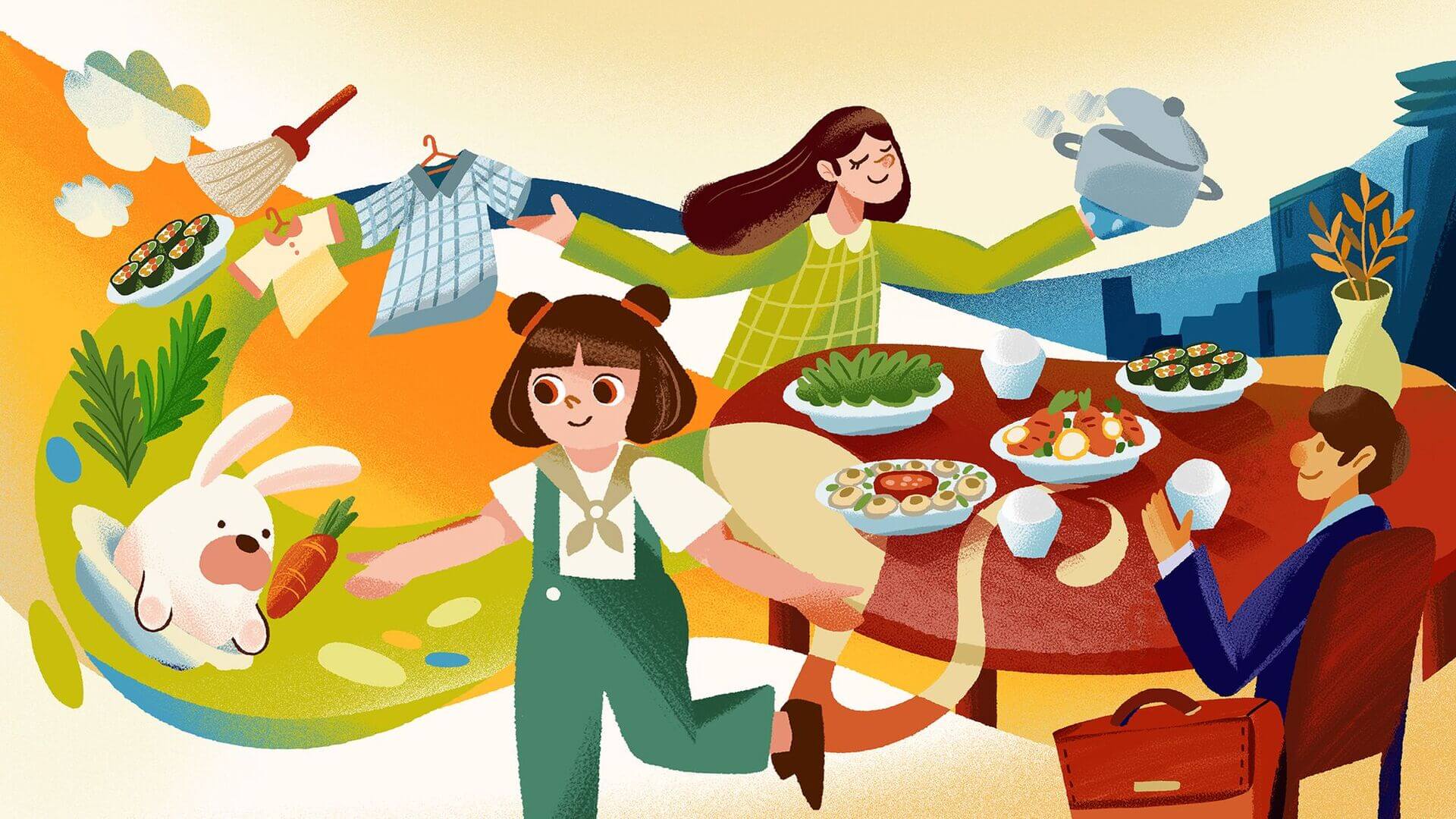
Enlightenment comes from every intention of presenting a meal with love
【Meeting Upāsikā Prabhūtā in Samudra-pratiṣṭhāna】
Upāsikā Prabhūtā is an ordinary housewife who prepares different kinds of delicacies to meet the requirement of numerous sentient beings from members of her family to neighbors, acquaintances, and even strangers. She presents the food with love and generosity to satisfy the visitors to her house no matter how much they eat. Her generosity creates her ability to offer boundless food even though she prepares all the dishes by herself. The story of Upāsikā Prabhūtā serves as a reminder to all of us that with love and mindfulness every routine work and even housework we do can turn out to be of great merit.
【Learning from Elder Ratnacūda】
Being a housewife is often seen as valueless despite the fact that it is always the wife, or mom, in the family to take care of everything at home from cooking, children nurturing, housework to pre-school education of young kids. Sometimes they even need to set aside their personal plan to drive the children to school in the morning or pick them up after school. Having all the contributions they made to the family, their selfless devotion has been rarely identified by other family members, mainly for the reason that they are not earning money.
Upāsikā Prabhūtā is one of the housewives in the world. Like all other housewives who take care of the housework and well maintain their family, she furthermore prepares meals for other sentient beings with the same amount of loving kindness she has to the beloved ones. She diligently practices generosity by offering food to all sentient beings who visit her upon individual request and needs. Her devotion won her a little treasure bowl that can come up with boundless food. The little treasure bowl can satisfy every sentient being, and the amount of the food coming up from the bowl never decreases. The treasure bowl results from the merit and virtue of Upāsikā Prabhūtā’s Dharma practice, which keeps multiplying as she continues to further her aspirations and make them stronger. The treasure she possesses has no limit because of her infinite aspiration, which will last now that sentient beings will never stop making a wish.
Upāsikā Prabhūtā practices great generosity with her perfection of “Patience” by meeting the requirements of all sentient beings. The practice and food offering guided her to the accomplishment of other practices of the Six Perfections in Mahayana Buddhism. She treated all sentient beings in the same way as she loved her family, and her loving kindness won recognition of all the visitors, who said that they not only received the meal but also enjoyed the loving kindness of Upāsikā Prabhūtā. The meals sincerely offered by an ordinary housewife like Upāsikā Prabhūtā proved to benefit sentient beings just like how Buddha Sugandhakuta’s used to guide them with the flavor of food and smells toward the full enlightenment.
In Avatamsaka Sutra, the Pure Conduct Chapter reads,
When I obtain delicious food, I vow that sentient beings will fulfill their hopes and be free of envy and desires in their minds.
When I obtain unappetizing food, I vow that sentient beings will attain, without exception, the experience of all samadhis.
When I obtain soft food, I vow that sentient beings will be permeated by great compassion so that their minds are supple and soft.
When I obtain coarse and rough food, I vow that sentient beings will have no defiled attachments in their minds, forsaking worldly greed and attachment.
When I eat, I vow that sentient beings will take dhyana bliss as food and be filled with the joy of Dharma.
Whenever being offered with pleasant food, we should take it as a chance to make a vow for ultimately eliminating our inner desires and envy. Whenever being offered with food that’s not attractive, we should keep in mind the teaching that the best food for bodhisattvas should be the Dharma joy emerged from meditation. By having soft food, we remind ourselves to maintain great compassion and a sense of flexibility. In the face of rough food, it’s time to train the mind to stay away from attachment and desire. Overall, there are five contemplations to remember at mealtime— every mouthful of food should be treasured as it is not easy to come by; reflection on whether our conduct makes us deserved to get the food; be vigilant against the Three Poisons of attachment, anger and ignoration; taking the food properly as good medicine without the thought of indulgence; and the major reason for taking the food is for working on the accomplishment of full enlightenment. Furthermore, we shall come up with the wish that all sentient beings share the same practice and attain Dharma bliss, in the meantime when their physical bodies are nourished. In that case, every little ingredient of cooking may turn out to be a treasure for the Dharma practice advancement. Simply by making a genuine wish to satisfy others’ appetite and need, we’re working on the practice of Bodhisattva to benefit all sentient beings.
【Come to listen to Sudhana’s stories】
Following the instructions of people who I met on the street to find the biggest mansion in the town, I finally arrived at the house of Upāsikā Prabhūtā in Samudra-pratiṣṭhāna. It was an incredible grand house that could even be transformed into a public lecturing hall. The incredible size of the house makes it possible to accommodate one billion people inside. And then I saw Upāsikā Prabhūtā sitting on her seat. Dressing in a modest way, her face is shining despite the fact that she wears no jewelry and make-up. The mansion of Upāsikā Prabhūtā is extremely huge, magnificent, and it was packed with guests who were there to enjoy a meal. There’s nothing unnecessary inside the grand hall, and I notice that the only possession of Upāsikā Prabhūtā is a little bowl she holds in her hands.
Upāsikā Prabhūtā was surrounded by ten thousand young ladies who were born with a delicate scent. People said that the fragrance would magically purify all kinds of negativity the visitors have as soon as they detect the scent. There would be no more smears, hatred, jealousy, affectation, attachment, anger, and ignorance in the visitors’ mind. I was told that once having met the young ladies in the house of Upāsikā Prabhūtā, every sentient being would be sharing the same hope and goal to benefit others and perfect the practice of self-discipline. I took it as hearsay, but my doubt was immediately cleared when I became one of the guests to the mansion. Hearing the voice of the young ladies and seeing their manners inspired me with a sense of joy that is free of attachment and desire. I am full of admiration and respect for Upāsikā Prabhūtā.
Offering my greeting to Upāsikā Prabhūtā, I rendered my question: “I am a Dharma practitioner who’s made a great vow to develop Bodhicitta. I wish to learn from you about how to perfect the practice of benefitting all sentient beings. Please show me how to make it.”
In response to my request, Upāsikā Prabhūtā said: “My dear, please wait and see what will be happening.” Before long, I saw more and more visitors entering the house, finding their seat upon the guidance of Upāsikā Prabhūtā and her entourage. Then the little bowl Upāsikā Prabhūtā held in her hands started to come up with more and more delicacies. The dishes were served in line with individual requests of the visitors depending on their needs. Upāsikā Prabhūtā offered people of different groups the proper meals they’ve looked for. The meals for the visitors who harbored malicious intentions, for example, would help eliminate their harmfulness. The meals presented to kind and loving practitioners would help reinforce their Dharma faculty. The meals served to ordained monks would help solidify their determination to advance on the Dharma path, whereas the meals offered to government dignitaries who come to visit Upāsikā Prabhūtā would make them be reminded and encouraged to keep in mind of taking good care of people, making it the priority of their governance. Upāsikā Prabhūtā realizes her great vow to offer food to relieve different sentient beings of all Dharma realms— from Bodhisattva practitioners who can advance their Dharma progress to reach the ten grounds with the meals she presented, to the hungry ghosts in the lower realm who can end with the endless torture of hunger should they get an offer from Upāsikā Prabhūtā. As a visitor to the mansion, Upāsikā Prabhūtā of course treated me to a meal nurturing my pursuit of Bodhisattva perfection. “Now that you have seen the way how I present meals to all sentient beings upon their needs, it should help you with some inspiration about how to practice the Bodhisattva path. I practice my Dharma vow by offering sentient beings with meals that help remove their afflictions, and inspire their will to purify their mind to develop bodhicitta.”
“Yes, I do. I now realize that practicing generosity is a key to advance on the Bodhisattva path. But I am still curious about…” I was trying to ask one more question to Upāsikā Prabhūtā, who seemed to have been aware of my curiosity.
“Is this the one you’re curious about?” She raised the bowl with a smile.
Upāsikā Prabhūtā explained that the bowl is a manifestation of her accomplishment of a Dharma practice named “The Endless Treasure of Virtues and Merits.”
“It’s empty inside, which signifies the limitless space. With limitless virtues and merits inside the treasure bowl, surely I can satisfy the needs of all sentient beings. Now that it is empty inside, there’s no limit for my offering. When I cherish every sentient being as my beloved family, I am willing to satisfy all their needs with loving kindness, and it turns out to be a support to my own advancement of Dharma practice, reinforcing my capability to practice generosity.” said Upāsikā Prabhūtā.
I think I understand how the little bowl of Upāsikā Prabhūtā turned into a great treasure pool. The limitless loving kindness the owner has developed enabled the bowl to come up with endless food as an offering to all sentient beings. Upāsikā Prabhūtā made the offerings as her practices of cultivating generosity, loving kindness and patience, and her conduct proved that even the time spent for household and other chores can be a good opportunity for Dharma practice that leads us to great advancement on the Bodhisattva path. The only key to make it happen is our realization and determination to become another Upāsikā Prabhūtā in our world.
I learn from the visit of Upāsikā Prabhūtā that the practice of food offering can indeed be done with profound wisdom. It is actually the easiest and the most common way to relieve sentient beings from suffering and serve as the start for helping and guiding them to full enlightenment. It’s reasonable that one would think about development of spirituality only when his/her physical requirements are satisfied. Upāsikā Prabhūtā’s food offering perfectly exemplifies the teaching of a Buddhist sutras The Treatise on the Great Perfection of Wisdom that “One should start with establishing ties with sentient beings through satisfying their physical desires, and then it is possible to guide them to explore the profundity of Dharma wisdom.” Finally, the story of Upāsikā Prabhūtā reminds me of another lady who takes care of everything in my life from food offering to mental support. I can’t wait to go home, sharing my gratitude and precious experience of the trip with my mom!
Come join me and Rabi for the next trip to visit other masters!
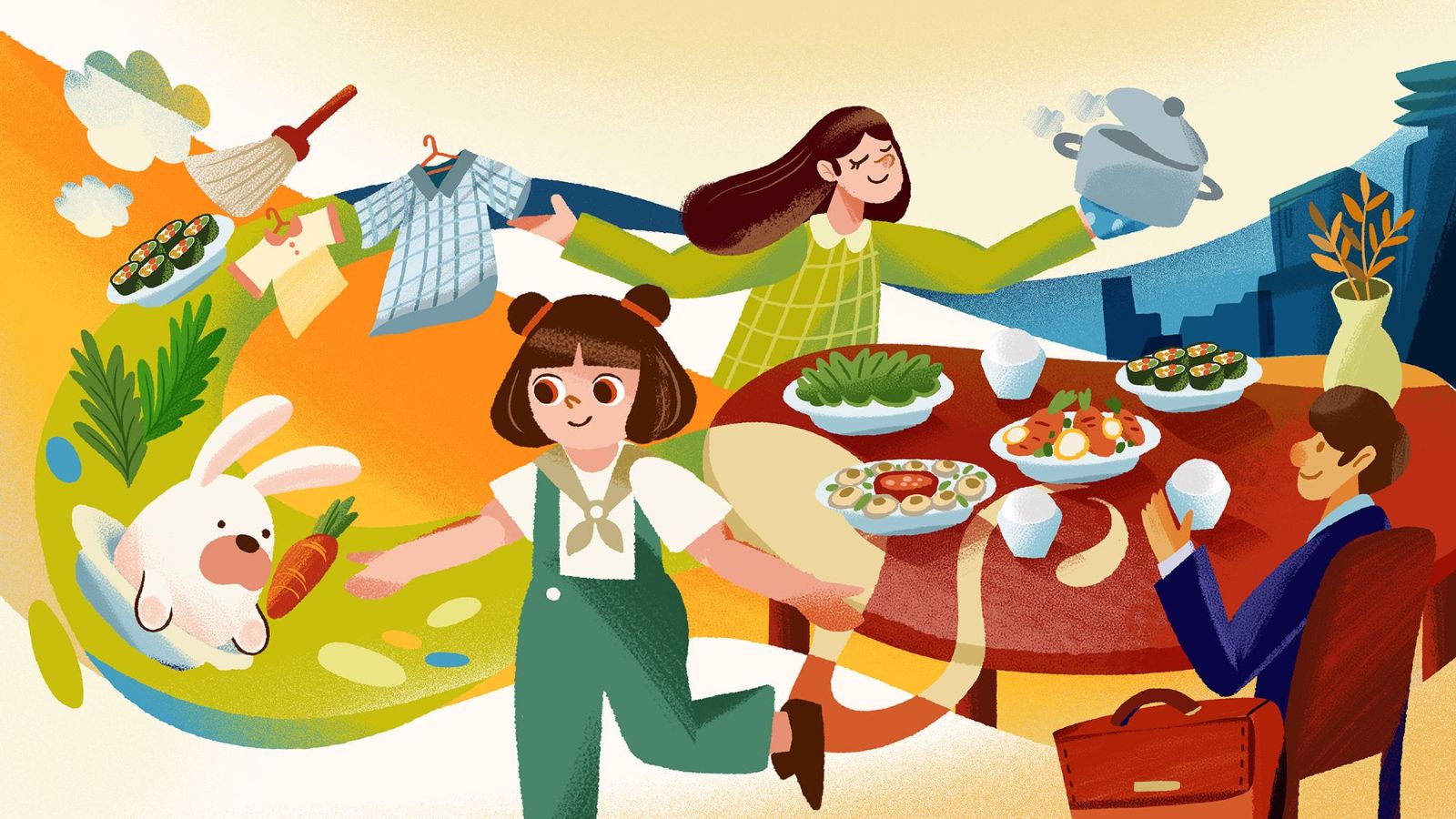 Enlightenment comes from every intention of presenting a meal with love.
Enlightenment comes from every intention of presenting a meal with love.
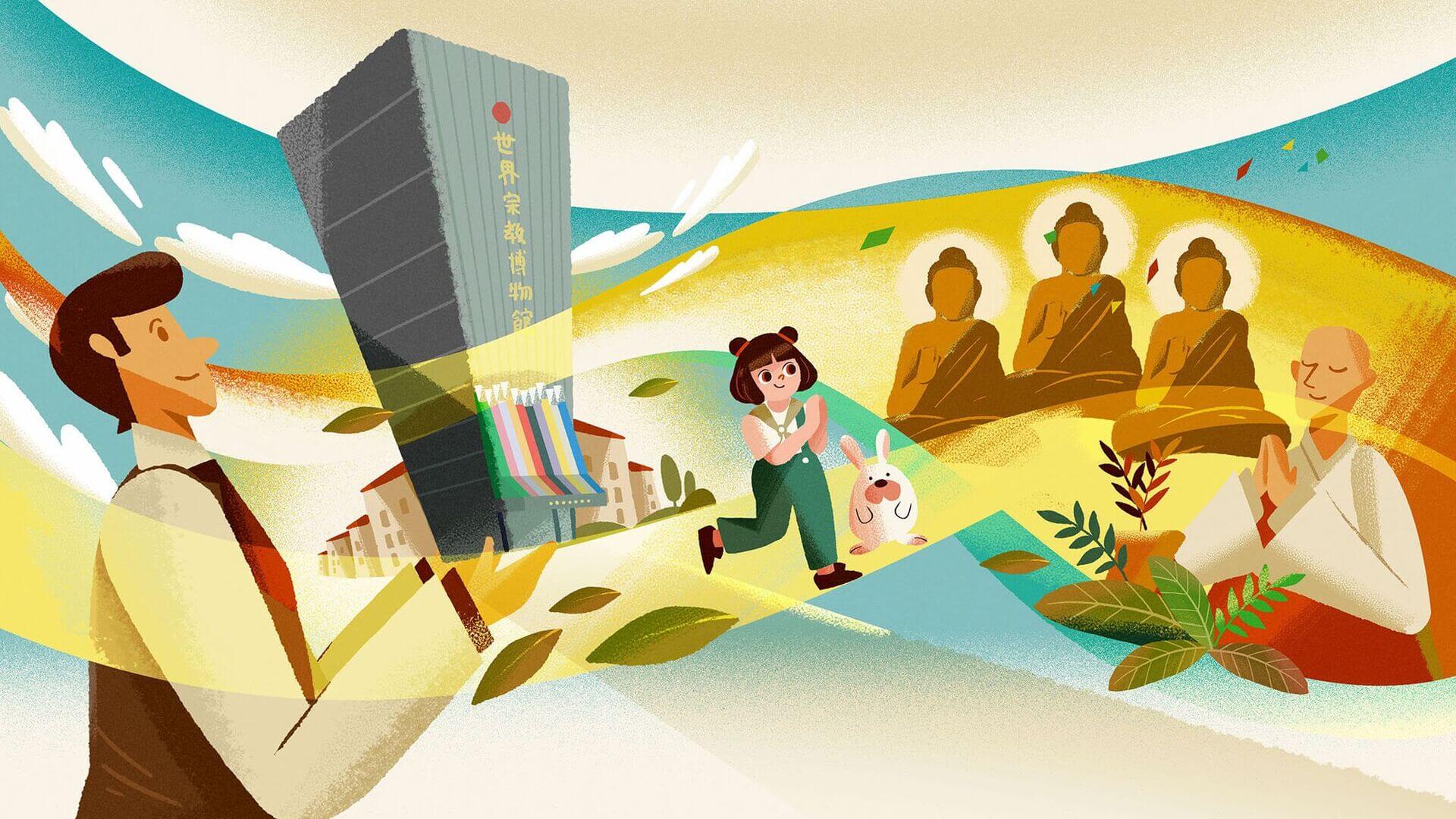
Practicing selfless generosity by turning the house into a Dharma Hall
Practicing selfless generosity by turning the house into a Dharma Hall.
Guiding all to the wisdom of Dharma by satisfying their mundane needs.
【Meeting Elder Ratnacūda in Chapter 15 of the Avatamsaka Sutra】
Elder Ratnacūda is a rich man who owns a 10-story house. He’s known for practicing great generosity to invite the public to his mansion with provision of food and other daily commodities. The great fortune he enjoys results from the accumulated merits he gained in the previous lives through conducts including burning incense and music as offerings to Buddha and providing Dharma practitioners accommodation to carry out their training and practice. The story of Elder Ratnacūda reminds us of a benefactor and follower of Master Hsin Tao who offered the land which turned out to be the location of the Museum of World Religions nowadays. The offering made the LJM possible to launch the plan of establishing the museum with the funding it later received from the public to come up with the current institute which well demonstrates the pure and beautiful profundity of global religions, paving the way for the expected realization of a harmonious world of dynamic cultures.
【Learning from Elder Ratnacūda】
Have you ever wondered why some people are born with a silver spoon in their mouth when others are not? Most people, but not Buddhists, would see the difference as the fate that cannot be changed. As what Buddha has unveiled to us, there must be a reason for every happening, or the result.
Elder Ratnacūda became a billionaire as the fruit of his practice of generosity in numerous previous lives. He not only made offerings to Buddhas, but also shared all his personal belongings to other sentient beings. Elder Ratnacūda never hesitated to share his food, money, and even the 10-story house to others. Having the chance to learn from Buddhas’ teaching, he wanted to see more people to benefit from Dharma, too. He therefore transformed his luxurious home to a public hall of dharma lecturing and practice. He practiced generosity in different styles in his 10-story mansion by making offerings from different materials to the sharing of Dharma teaching, and finally he helped the visitors to attain fearlessness because of Dharma practice. People who received his offering were able to advance their spiritual regaining from being physically comfortable in the beginning to the stage of enjoying mental peace, before that they ultimately embark on the path to full enlightenment.
The conduct of Elder Ratnacūda to share his wealth without hesitation and personal concern reminds me of a modern billionaire. A co-founder of Microsoft, Bill Gates has been included in the Forbes list of the world's wealthiest people since 1987. Rather than leaving all the money to his children, however, Gates chose to spend all his personal wealth on founding the Bill & Melinda Gates Foundation, a private charitable foundation he and his then-wife Melinda established in 2000, to focus on philanthropic efforts on climate change, global health and development, and education. Despite the difference of time and space, the two billionaires made the same decision to share their huge fortune with the public, benefiting the world rather than merely benefiting their children.
The Chapter of Pure Conduct in the Avatamsaka Sutra shared with us some examples about retaining our mindfulness in daily life. In the face of a person who declines to offer his/her personal belongings to others in need, for example, a bodhisattva would make a wish to hope that one day all sentient beings will know the impermanent nature of materials and wealth thus they are able to practice generosity. Seeing a person who is willing to share his/her belongings to others, a bodhisattva would then make the wish to hope that one day all sentient beings will end their sufferings in the three lower realms. A bodhisattva, furthermore, would hope to see that one day all sentient beings will regain their inherent wisdom, or Tathagata, to learn from Dharma and practice their learning to attain ultimate enlightenment.
【Come to listen to Sudhana’s stories】
Rabi and I ran into Elder Ratnacūda when we were on the way to the city where he lived. Having greeted the elder, I rendered my question to him: “I’ve generated my aspiration to practice Bodhicitta. I come here to ask for your guidance on how to perfect the practice on the Path of Bodhisattva.” Elder Ratnacūda listened to my question, but he didn’t show me the answer right away. Instead, he held my hands, bringing me to his house.
Elder Ratnacūda spoke to me only when we were about to arrive at his house. He said, “Dear Sudhana, I can’t think of any advice for you. The only thing I can offer you, I think, is show you around my house to see how I live a life of practicing generosity.”
Looking around the splendid house of Elder Ratnacūda, I found that the mansion is built with walls of seven jewels and decorated with art glass. On the roof there is a beautiful net made with intertwined magical jewels. The mansion is so magnificent that it is equipped with eight giant entrances in the surroundings, and the whole space inside is bathed in a soft, golden luminosity.
The ten-story house of Elder Ratnacūda serves as the place where he practices the perfection of generosity. Each floor was designated with individual items to be offered to the public. With the personal guidance of Elder Ratnacūda, I visited the ten floors of the mansion. I saw that on the first floor there are plentiful foods and drinks prepared for people who are hungry. On the second floor, there are clothes offered to people who are in need. There are other daily commodities on the third floor, whereas Elder Ratnacūda also presents rare precious stones and jewels as part of his offerings to the needy on the fourth floor.
Elder Ratnacūda made the fifth floor of his mansion to accommodate bodhisattvas who have attained the fifth-ground accomplishment of Dharma practice. They are invited to stay there to further the practice of meditation for reaching the meditative state consciousness of samadhi, while they are also invited to lecture Dharma to the public. On the sixth floor, the Elder invites bodhisattvas who completed the six-ground stage to stay and lecture on how to practice the different Dharma trainings on wisdom, which expect to lead one to realize the non-dual relationship between conventional truth and ultimate truth, as well as between samsara and nirvana. When I go upstairs to the seventh floor, there are bodhisattvas on the seventh-ground who are well receiving Buddhas’ teachings now that their Dharma achievements have eliminated all their afflictions. Then numerous “Eighth Bhumi bodhisattvas", who are said to be "irreversible" because they are now destined for full Buddhahood, are on the eighth-floor of the mansion. They enlighten all sentient beings by showing the wonderful result of their Dharma practice. On the ninth floor, I saw bodhisattvas who are about to perfect their Dharma practice to attain Buddhahood— the ultimate goal for all Dharma practitioners including the bodhisattvas on the tenth floor who have attained enlightenment.
The ten-story offerings of Elder Ratnacūda illustrate the development of Dharma practice from the will of wealth sharing to the sharing of Dharma, from little effort to profound aspiration, and from limited sharing to boundless offering for perfection of the generosity practice. The Elder’s fortune and his Dharma wisdom have profoundly inspired and encouraged me.
I want to know how Elder Ratnacūda accumulated the extensive merit to enjoy such great fortune and blessings in this life. “I’ve never seen anyone like you who can afford and are willing to offer so many bodhisattvas accommodation, providing them support to advance their Dharma practice. What have you done to make you live this wonderful life?” I asked Elder Ratnacūda, who said in response: “It was a long time ago, when I was in one of my previous lives. One day I was told that the Buddha was coming to town. I was so happy and looking forward to offering the Enlightened One. I burnt incense and offered the Buddha with music, making three wishes when I dedicated the merit. I made my first wish to be far away from poverty and suffering. Then I made my second wish hoping that I can always be born in a place with buddhas, bodhisattvas, and good teachers. And my third wish was that since having been born in a place with the great masters, I pray to be able to receive Dharma teachings every life. I think my three wishes have been realized so that I can live this life.
During the visit to the mansion of Elder Ratnacūda I learned his generosity to share all personal belongings with others. He presents the ten-story house to sentient beings and relieves them from all kinds of challenges from physical hunger to mental suffering. The level of generosity that Elder Ratnacūda practices has elevated from satisfying the basic, physical needs of other sentient beings to guiding them to enjoy mental richness. His conduct, furthermore, has greatly benefited later generations of the family than leaving them the wealth.
The story of Elder Ratnacūda reminds me of a follower of Master Hsin Tao who presented his land in the downtown area of New Taipei City as an offering to the Ling Jiou Mountain Buddhist Society. The 6,600 square meter land is now home to the Museum of World Religions, which attracts thousands of visitors every year to explore the history and features of world religions and deepen their endorsement to realize global peace through promotion of religious harmony and exchanges.
The last but not the least thing that I learned from my trip to Elder Ratnacūda’s mansion is that” Giving” is not merely about sharing wealth with others. It can be done, furthermore, in a humble mindset to present everything of ours as an offering to all sentient beings. I found that the idea has made it easier for me to follow and practice Bodhisattva Samantabhadra’s teaching of “Making Extensive Offerings.” The mindset of being humble to everyone I encounter in everyday life will make it easy to be friendly, smiling and sincerely able to offer my greeting anytime. My goodwill may present the person who receives it a good start of the day and even a boost to his/her confidence and hope. The result will surely benefit me in the end, as a good karmic bond’s been established.
Stay tuned to more stories of my journey to visit 53 Great Masters
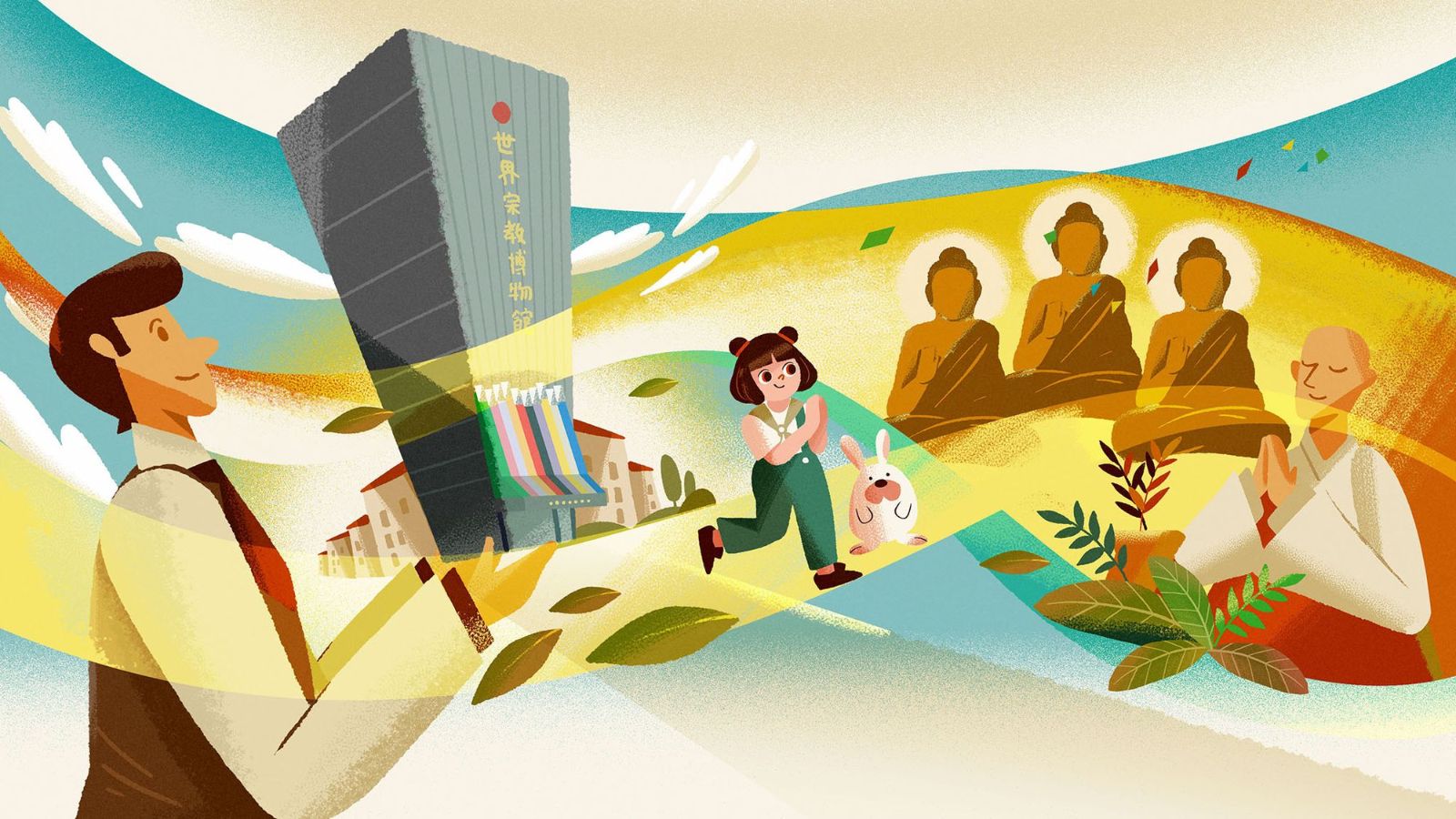
Practicing selfless generosity by turning the house into a Dharma Hall.
Guiding all to the wisdom of Dharma by satisfying their mundane needs.
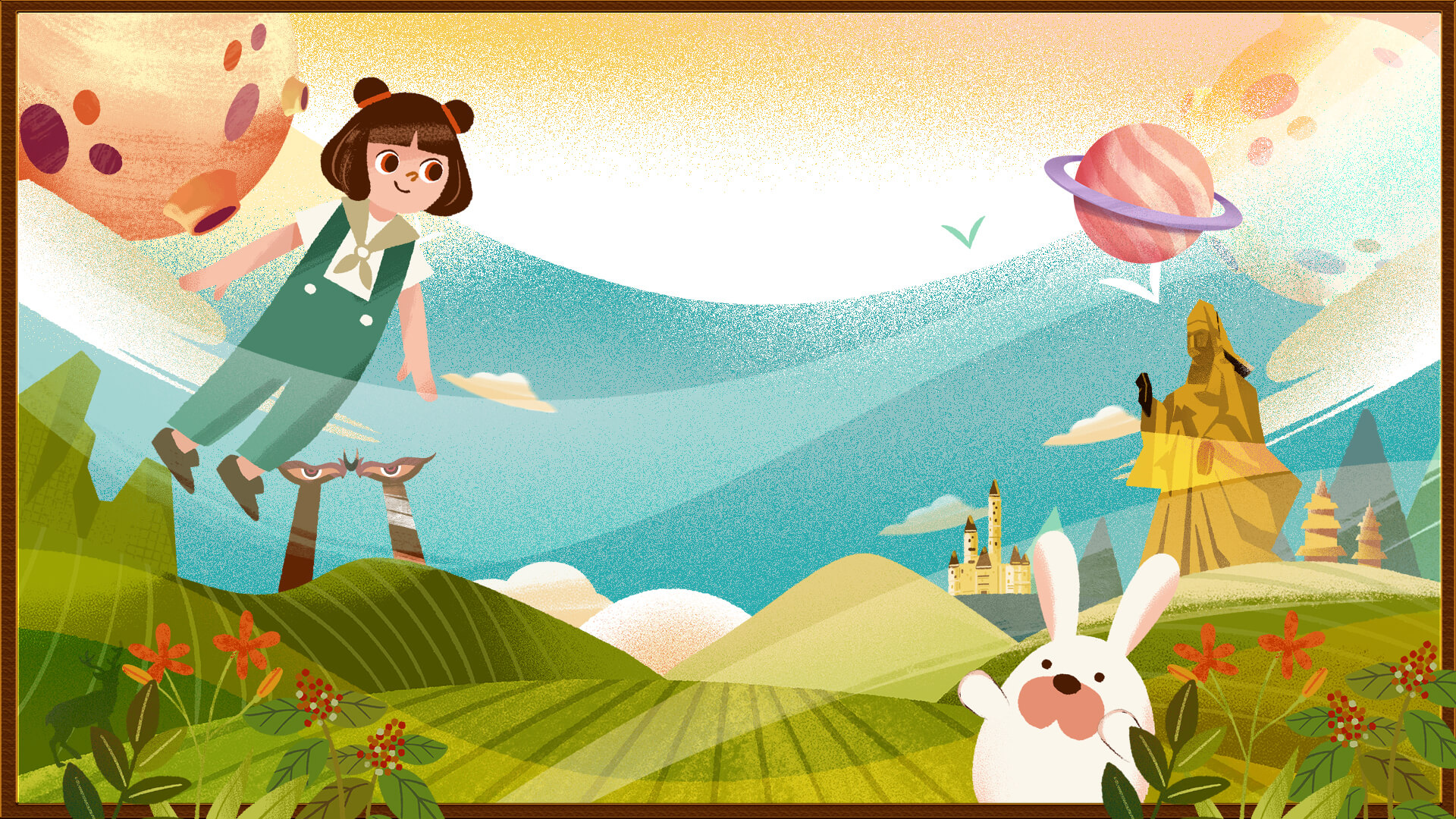
Master Hsin Tao’s lecture on the 53 visits of Sudhanakumāra
Make a good use of your mind; Realize, then stop clinging
The world view presented on the Avatamsaka Sutra, which was given by the Buddha to the bodhisattvas who have attained their realization of dharmakaya when he abided in the dhyana, is seen as the most complete illustration of the Buddhist view of the universe. The “Dharmadhatu Dependent Origination” thoughts identify the interconnection of every individual existence in the universe so that they influence and accommodate each other. The Dharmadhatu is literally our spiritual life, or the so-called spirituality. It intertwines with our every present thought, and the whole Avatamsaka Sutra talks about the ways to go deep to explore the Dharmadhatu.
Master Hsin Tao taught us that our world is the reward-land of Siddhartha Gautama, mostly commonly referred to as the Buddha. The land provides us a chance to liberate from suffering by realizing the truth of suffering. There is no way to liberate ourselves from suffering, however, if we don’t realize that ultimately we must work on liberating ourselves from suffering. The world of Avatamsaka is actually a world of reflection of our mind. It is a world created by willpower, which originated from syllables. Syllables are learned through education, which begins with practice, and are attained through practice.
The Avatamsaka Sutra said that bodhisattvas will attain all great merits should they make a good use of their mind. How can we make use of our mind? Why is it said that the Chapter on Entering the Dharma Realm of the Avatamsaka Sutra is the chapter that most reaches our living world? What is it all about for Sudhanakumāra to embark on the 53 visits? Why is it said that the journey of Sudhanakumāra is the practice of Bodhisattva path? Be sure to tune in to the program “Master Hsin Tao’s lecture on the 53 visits of Sudhanakumāra”.
